Analysis of Leadership Styles and Theories
VerifiedAdded on 2020/10/05
|18
|5201
|212
AI Summary
The provided assignment requires a comprehensive analysis of leadership styles and theories, including a critical evaluation of research findings, practice, and skills related to leadership. It involves identifying and discussing various types of leadership styles, such as situational, transformational, transactional, and others, along with their characteristics and implications. The assignment also covers the role of leaders in creating, implementing, sustaining, or avoiding socially responsible firm behaviors, as well as the impact of leadership on corporate culture and organizational commitment. Additionally, it includes a review of relevant literature and online resources related to leadership styles and theories.
Contribute Materials
Your contribution can guide someone’s learning journey. Share your
documents today.
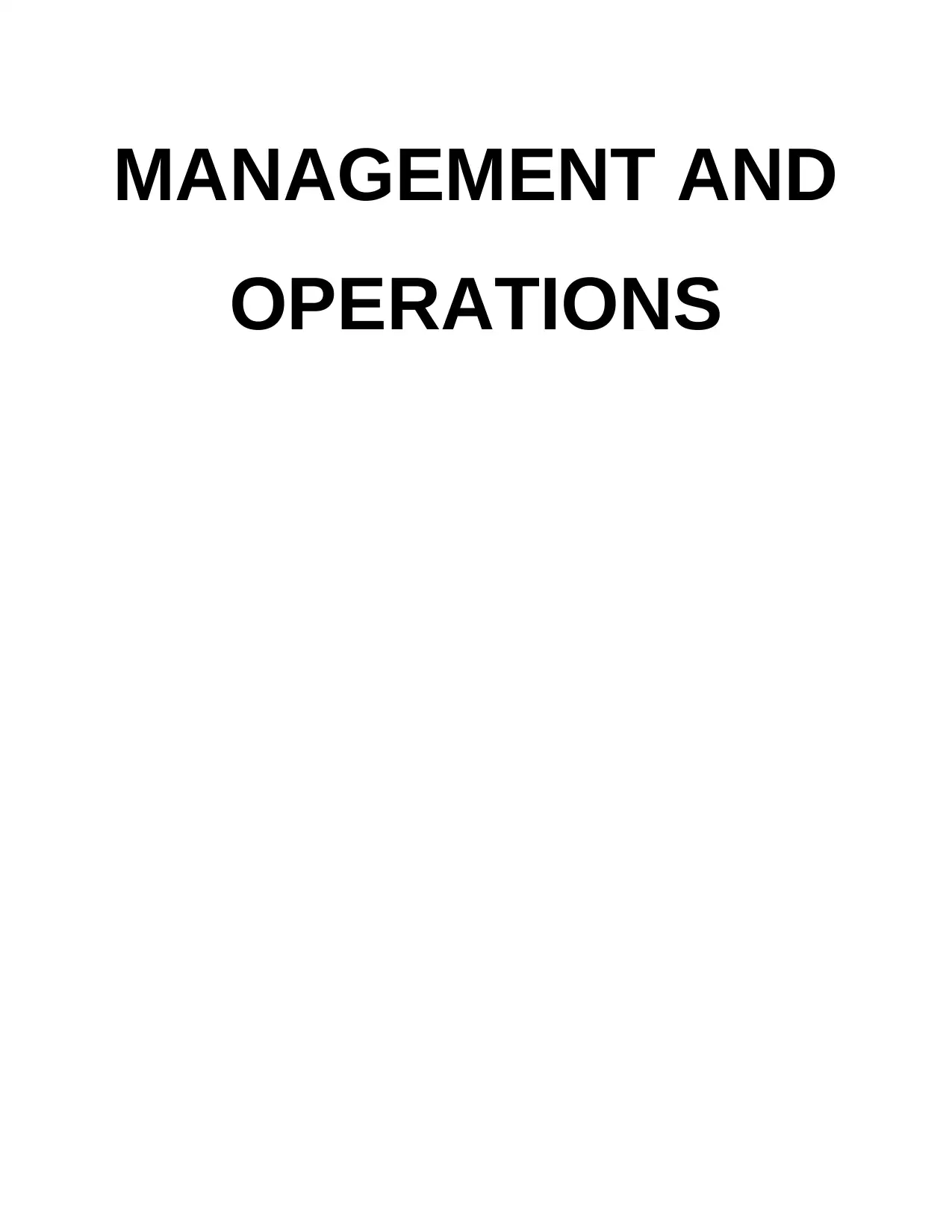
MANAGEMENT AND
OPERATIONS
OPERATIONS
Secure Best Marks with AI Grader
Need help grading? Try our AI Grader for instant feedback on your assignments.
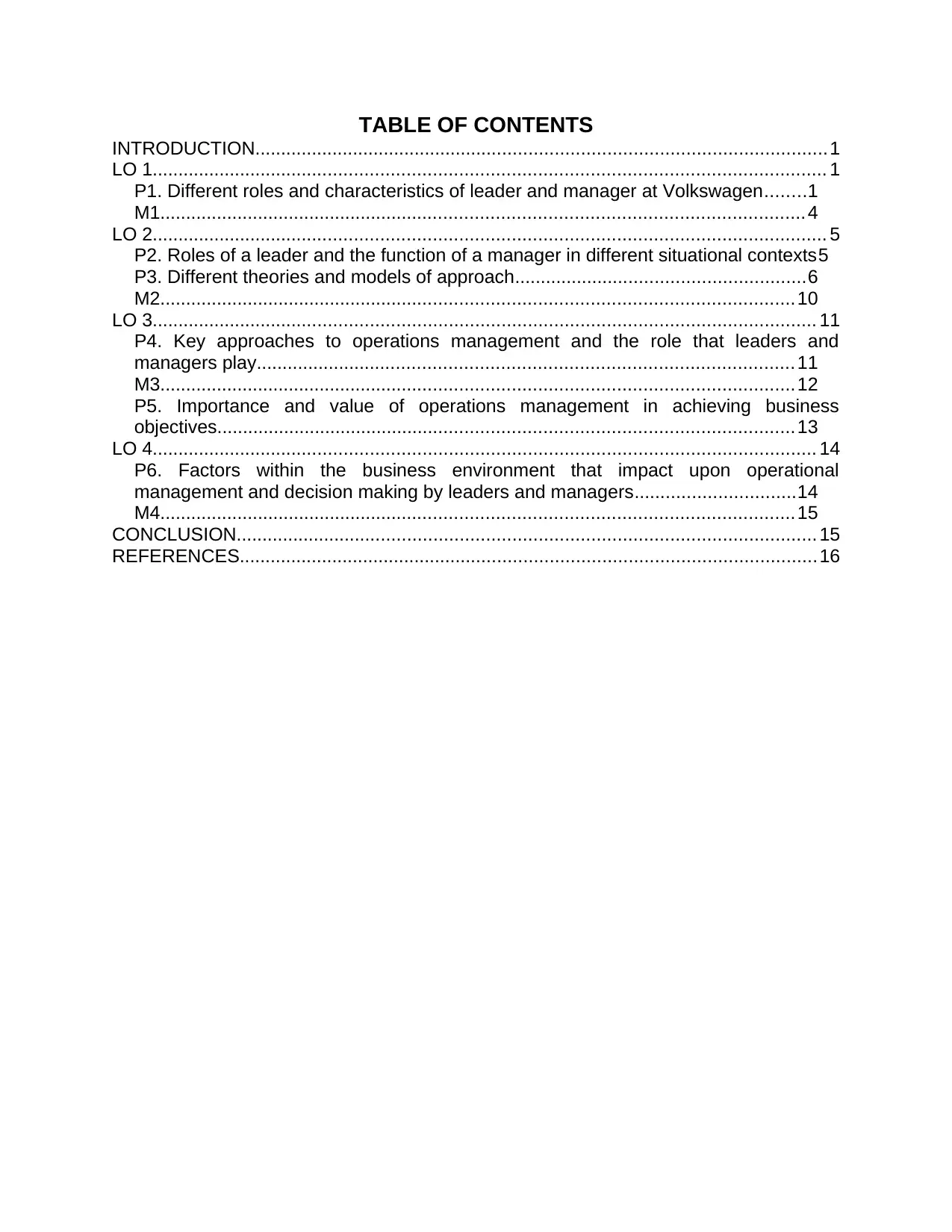
TABLE OF CONTENTS
INTRODUCTION..............................................................................................................1
LO 1................................................................................................................................. 1
P1. Different roles and characteristics of leader and manager at Volkswagen........1
M1............................................................................................................................4
LO 2................................................................................................................................. 5
P2. Roles of a leader and the function of a manager in different situational contexts5
P3. Different theories and models of approach........................................................6
M2..........................................................................................................................10
LO 3............................................................................................................................... 11
P4. Key approaches to operations management and the role that leaders and
managers play....................................................................................................... 11
M3..........................................................................................................................12
P5. Importance and value of operations management in achieving business
objectives...............................................................................................................13
LO 4............................................................................................................................... 14
P6. Factors within the business environment that impact upon operational
management and decision making by leaders and managers...............................14
M4..........................................................................................................................15
CONCLUSION............................................................................................................... 15
REFERENCES...............................................................................................................16
INTRODUCTION..............................................................................................................1
LO 1................................................................................................................................. 1
P1. Different roles and characteristics of leader and manager at Volkswagen........1
M1............................................................................................................................4
LO 2................................................................................................................................. 5
P2. Roles of a leader and the function of a manager in different situational contexts5
P3. Different theories and models of approach........................................................6
M2..........................................................................................................................10
LO 3............................................................................................................................... 11
P4. Key approaches to operations management and the role that leaders and
managers play....................................................................................................... 11
M3..........................................................................................................................12
P5. Importance and value of operations management in achieving business
objectives...............................................................................................................13
LO 4............................................................................................................................... 14
P6. Factors within the business environment that impact upon operational
management and decision making by leaders and managers...............................14
M4..........................................................................................................................15
CONCLUSION............................................................................................................... 15
REFERENCES...............................................................................................................16
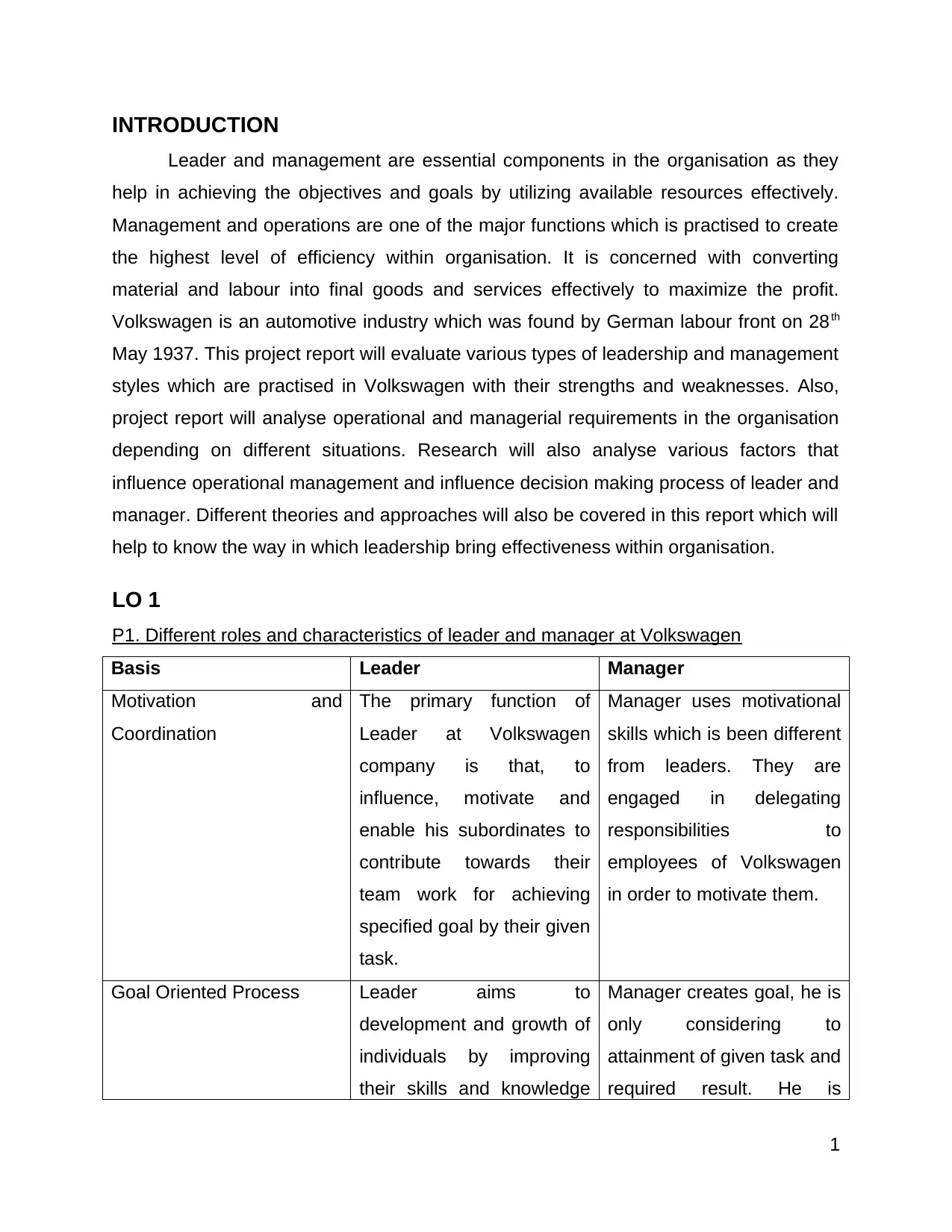
INTRODUCTION
Leader and management are essential components in the organisation as they
help in achieving the objectives and goals by utilizing available resources effectively.
Management and operations are one of the major functions which is practised to create
the highest level of efficiency within organisation. It is concerned with converting
material and labour into final goods and services effectively to maximize the profit.
Volkswagen is an automotive industry which was found by German labour front on 28th
May 1937. This project report will evaluate various types of leadership and management
styles which are practised in Volkswagen with their strengths and weaknesses. Also,
project report will analyse operational and managerial requirements in the organisation
depending on different situations. Research will also analyse various factors that
influence operational management and influence decision making process of leader and
manager. Different theories and approaches will also be covered in this report which will
help to know the way in which leadership bring effectiveness within organisation.
LO 1
P1. Different roles and characteristics of leader and manager at Volkswagen
Basis Leader Manager
Motivation and
Coordination
The primary function of
Leader at Volkswagen
company is that, to
influence, motivate and
enable his subordinates to
contribute towards their
team work for achieving
specified goal by their given
task.
Manager uses motivational
skills which is been different
from leaders. They are
engaged in delegating
responsibilities to
employees of Volkswagen
in order to motivate them.
Goal Oriented Process Leader aims to
development and growth of
individuals by improving
their skills and knowledge
Manager creates goal, he is
only considering to
attainment of given task and
required result. He is
1
Leader and management are essential components in the organisation as they
help in achieving the objectives and goals by utilizing available resources effectively.
Management and operations are one of the major functions which is practised to create
the highest level of efficiency within organisation. It is concerned with converting
material and labour into final goods and services effectively to maximize the profit.
Volkswagen is an automotive industry which was found by German labour front on 28th
May 1937. This project report will evaluate various types of leadership and management
styles which are practised in Volkswagen with their strengths and weaknesses. Also,
project report will analyse operational and managerial requirements in the organisation
depending on different situations. Research will also analyse various factors that
influence operational management and influence decision making process of leader and
manager. Different theories and approaches will also be covered in this report which will
help to know the way in which leadership bring effectiveness within organisation.
LO 1
P1. Different roles and characteristics of leader and manager at Volkswagen
Basis Leader Manager
Motivation and
Coordination
The primary function of
Leader at Volkswagen
company is that, to
influence, motivate and
enable his subordinates to
contribute towards their
team work for achieving
specified goal by their given
task.
Manager uses motivational
skills which is been different
from leaders. They are
engaged in delegating
responsibilities to
employees of Volkswagen
in order to motivate them.
Goal Oriented Process Leader aims to
development and growth of
individuals by improving
their skills and knowledge
Manager creates goal, he is
only considering to
attainment of given task and
required result. He is
1
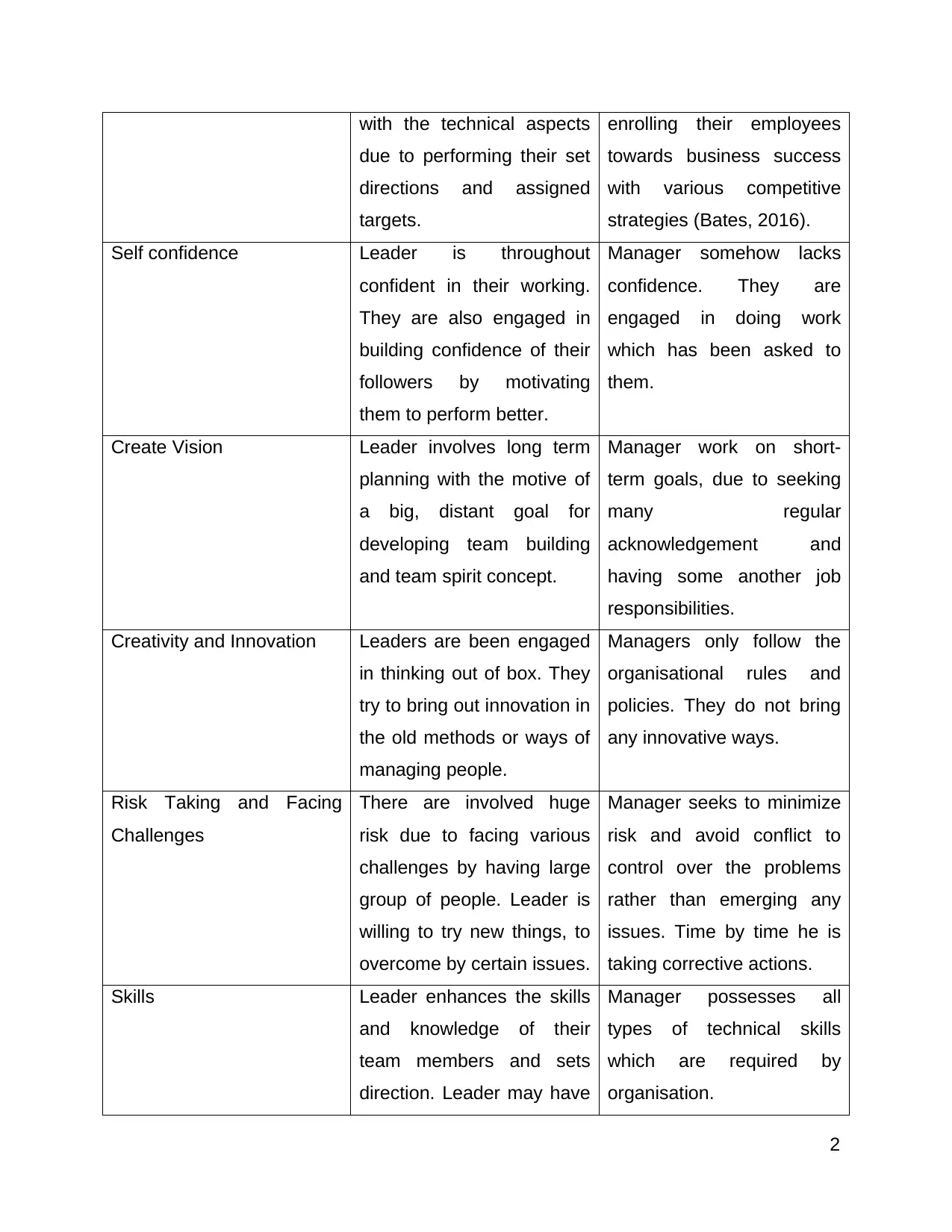
with the technical aspects
due to performing their set
directions and assigned
targets.
enrolling their employees
towards business success
with various competitive
strategies (Bates, 2016).
Self confidence Leader is throughout
confident in their working.
They are also engaged in
building confidence of their
followers by motivating
them to perform better.
Manager somehow lacks
confidence. They are
engaged in doing work
which has been asked to
them.
Create Vision Leader involves long term
planning with the motive of
a big, distant goal for
developing team building
and team spirit concept.
Manager work on short-
term goals, due to seeking
many regular
acknowledgement and
having some another job
responsibilities.
Creativity and Innovation Leaders are been engaged
in thinking out of box. They
try to bring out innovation in
the old methods or ways of
managing people.
Managers only follow the
organisational rules and
policies. They do not bring
any innovative ways.
Risk Taking and Facing
Challenges
There are involved huge
risk due to facing various
challenges by having large
group of people. Leader is
willing to try new things, to
overcome by certain issues.
Manager seeks to minimize
risk and avoid conflict to
control over the problems
rather than emerging any
issues. Time by time he is
taking corrective actions.
Skills Leader enhances the skills
and knowledge of their
team members and sets
direction. Leader may have
Manager possesses all
types of technical skills
which are required by
organisation.
2
due to performing their set
directions and assigned
targets.
enrolling their employees
towards business success
with various competitive
strategies (Bates, 2016).
Self confidence Leader is throughout
confident in their working.
They are also engaged in
building confidence of their
followers by motivating
them to perform better.
Manager somehow lacks
confidence. They are
engaged in doing work
which has been asked to
them.
Create Vision Leader involves long term
planning with the motive of
a big, distant goal for
developing team building
and team spirit concept.
Manager work on short-
term goals, due to seeking
many regular
acknowledgement and
having some another job
responsibilities.
Creativity and Innovation Leaders are been engaged
in thinking out of box. They
try to bring out innovation in
the old methods or ways of
managing people.
Managers only follow the
organisational rules and
policies. They do not bring
any innovative ways.
Risk Taking and Facing
Challenges
There are involved huge
risk due to facing various
challenges by having large
group of people. Leader is
willing to try new things, to
overcome by certain issues.
Manager seeks to minimize
risk and avoid conflict to
control over the problems
rather than emerging any
issues. Time by time he is
taking corrective actions.
Skills Leader enhances the skills
and knowledge of their
team members and sets
direction. Leader may have
Manager possesses all
types of technical skills
which are required by
organisation.
2
Secure Best Marks with AI Grader
Need help grading? Try our AI Grader for instant feedback on your assignments.
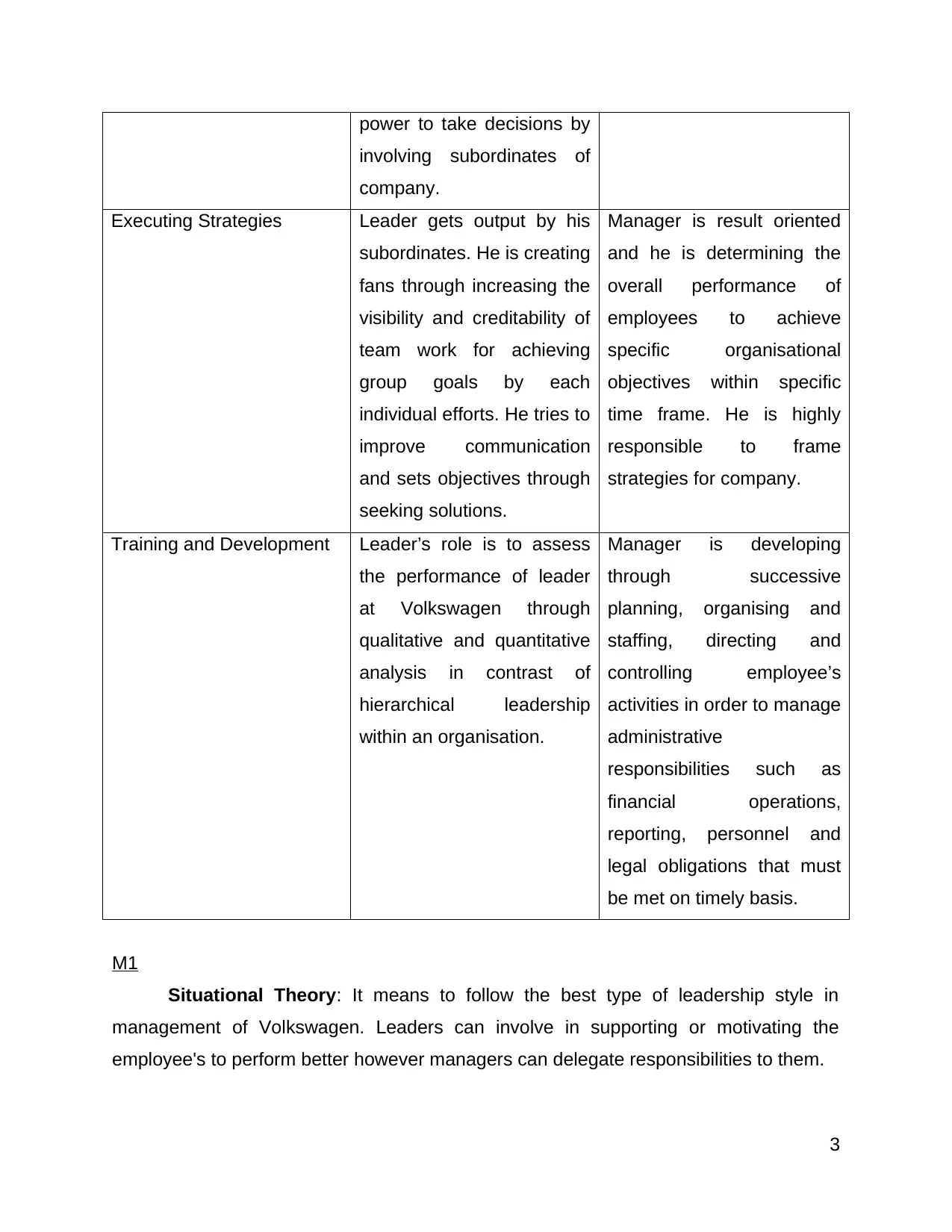
power to take decisions by
involving subordinates of
company.
Executing Strategies Leader gets output by his
subordinates. He is creating
fans through increasing the
visibility and creditability of
team work for achieving
group goals by each
individual efforts. He tries to
improve communication
and sets objectives through
seeking solutions.
Manager is result oriented
and he is determining the
overall performance of
employees to achieve
specific organisational
objectives within specific
time frame. He is highly
responsible to frame
strategies for company.
Training and Development Leader’s role is to assess
the performance of leader
at Volkswagen through
qualitative and quantitative
analysis in contrast of
hierarchical leadership
within an organisation.
Manager is developing
through successive
planning, organising and
staffing, directing and
controlling employee’s
activities in order to manage
administrative
responsibilities such as
financial operations,
reporting, personnel and
legal obligations that must
be met on timely basis.
M1
Situational Theory: It means to follow the best type of leadership style in
management of Volkswagen. Leaders can involve in supporting or motivating the
employee's to perform better however managers can delegate responsibilities to them.
3
involving subordinates of
company.
Executing Strategies Leader gets output by his
subordinates. He is creating
fans through increasing the
visibility and creditability of
team work for achieving
group goals by each
individual efforts. He tries to
improve communication
and sets objectives through
seeking solutions.
Manager is result oriented
and he is determining the
overall performance of
employees to achieve
specific organisational
objectives within specific
time frame. He is highly
responsible to frame
strategies for company.
Training and Development Leader’s role is to assess
the performance of leader
at Volkswagen through
qualitative and quantitative
analysis in contrast of
hierarchical leadership
within an organisation.
Manager is developing
through successive
planning, organising and
staffing, directing and
controlling employee’s
activities in order to manage
administrative
responsibilities such as
financial operations,
reporting, personnel and
legal obligations that must
be met on timely basis.
M1
Situational Theory: It means to follow the best type of leadership style in
management of Volkswagen. Leaders can involve in supporting or motivating the
employee's to perform better however managers can delegate responsibilities to them.
3
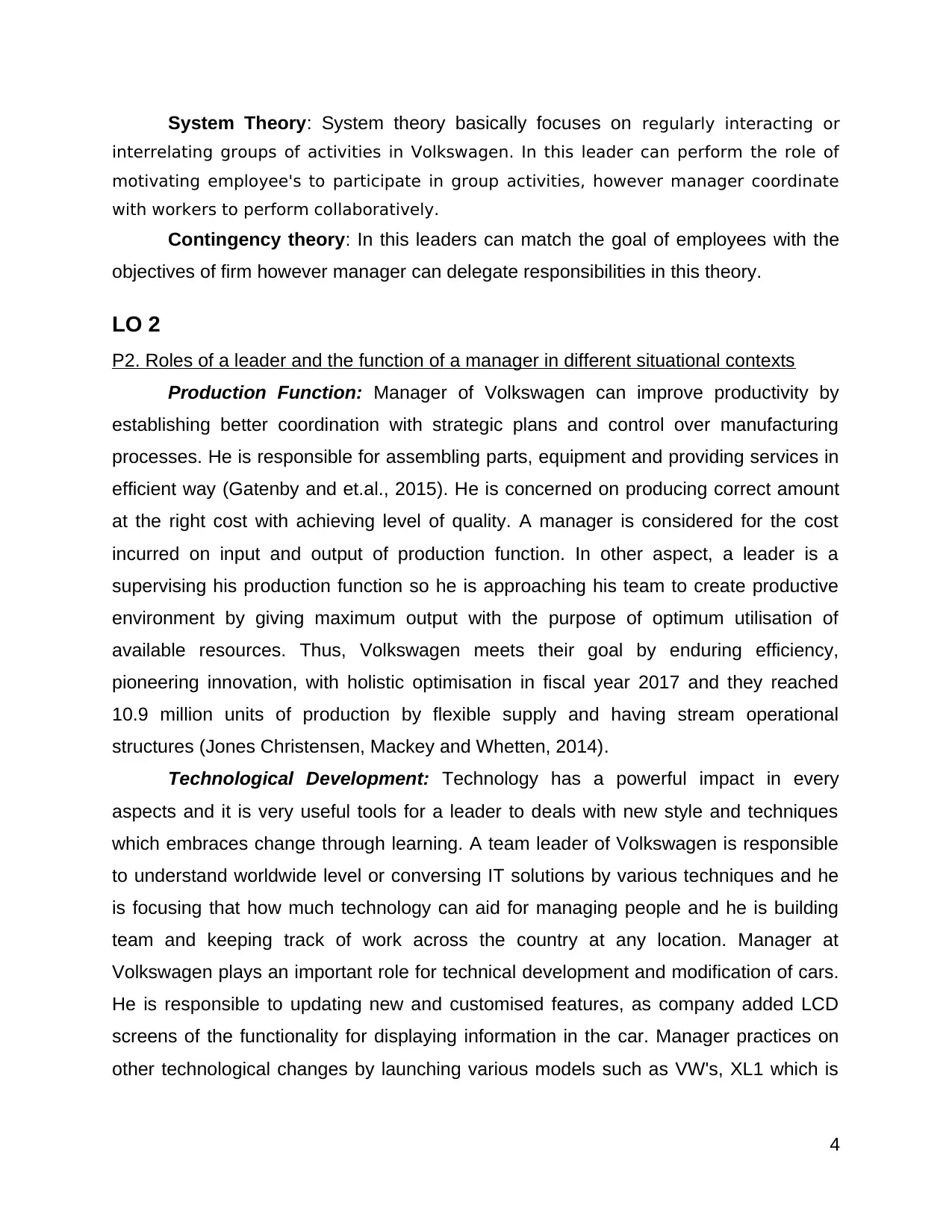
System Theory: System theory basically focuses on regularly interacting or
interrelating groups of activities in Volkswagen. In this leader can perform the role of
motivating employee's to participate in group activities, however manager coordinate
with workers to perform collaboratively.
Contingency theory: In this leaders can match the goal of employees with the
objectives of firm however manager can delegate responsibilities in this theory.
LO 2
P2. Roles of a leader and the function of a manager in different situational contexts
Production Function: Manager of Volkswagen can improve productivity by
establishing better coordination with strategic plans and control over manufacturing
processes. He is responsible for assembling parts, equipment and providing services in
efficient way (Gatenby and et.al., 2015). He is concerned on producing correct amount
at the right cost with achieving level of quality. A manager is considered for the cost
incurred on input and output of production function. In other aspect, a leader is a
supervising his production function so he is approaching his team to create productive
environment by giving maximum output with the purpose of optimum utilisation of
available resources. Thus, Volkswagen meets their goal by enduring efficiency,
pioneering innovation, with holistic optimisation in fiscal year 2017 and they reached
10.9 million units of production by flexible supply and having stream operational
structures (Jones Christensen, Mackey and Whetten, 2014).
Technological Development: Technology has a powerful impact in every
aspects and it is very useful tools for a leader to deals with new style and techniques
which embraces change through learning. A team leader of Volkswagen is responsible
to understand worldwide level or conversing IT solutions by various techniques and he
is focusing that how much technology can aid for managing people and he is building
team and keeping track of work across the country at any location. Manager at
Volkswagen plays an important role for technical development and modification of cars.
He is responsible to updating new and customised features, as company added LCD
screens of the functionality for displaying information in the car. Manager practices on
other technological changes by launching various models such as VW's, XL1 which is
4
interrelating groups of activities in Volkswagen. In this leader can perform the role of
motivating employee's to participate in group activities, however manager coordinate
with workers to perform collaboratively.
Contingency theory: In this leaders can match the goal of employees with the
objectives of firm however manager can delegate responsibilities in this theory.
LO 2
P2. Roles of a leader and the function of a manager in different situational contexts
Production Function: Manager of Volkswagen can improve productivity by
establishing better coordination with strategic plans and control over manufacturing
processes. He is responsible for assembling parts, equipment and providing services in
efficient way (Gatenby and et.al., 2015). He is concerned on producing correct amount
at the right cost with achieving level of quality. A manager is considered for the cost
incurred on input and output of production function. In other aspect, a leader is a
supervising his production function so he is approaching his team to create productive
environment by giving maximum output with the purpose of optimum utilisation of
available resources. Thus, Volkswagen meets their goal by enduring efficiency,
pioneering innovation, with holistic optimisation in fiscal year 2017 and they reached
10.9 million units of production by flexible supply and having stream operational
structures (Jones Christensen, Mackey and Whetten, 2014).
Technological Development: Technology has a powerful impact in every
aspects and it is very useful tools for a leader to deals with new style and techniques
which embraces change through learning. A team leader of Volkswagen is responsible
to understand worldwide level or conversing IT solutions by various techniques and he
is focusing that how much technology can aid for managing people and he is building
team and keeping track of work across the country at any location. Manager at
Volkswagen plays an important role for technical development and modification of cars.
He is responsible to updating new and customised features, as company added LCD
screens of the functionality for displaying information in the car. Manager practices on
other technological changes by launching various models such as VW's, XL1 which is
4
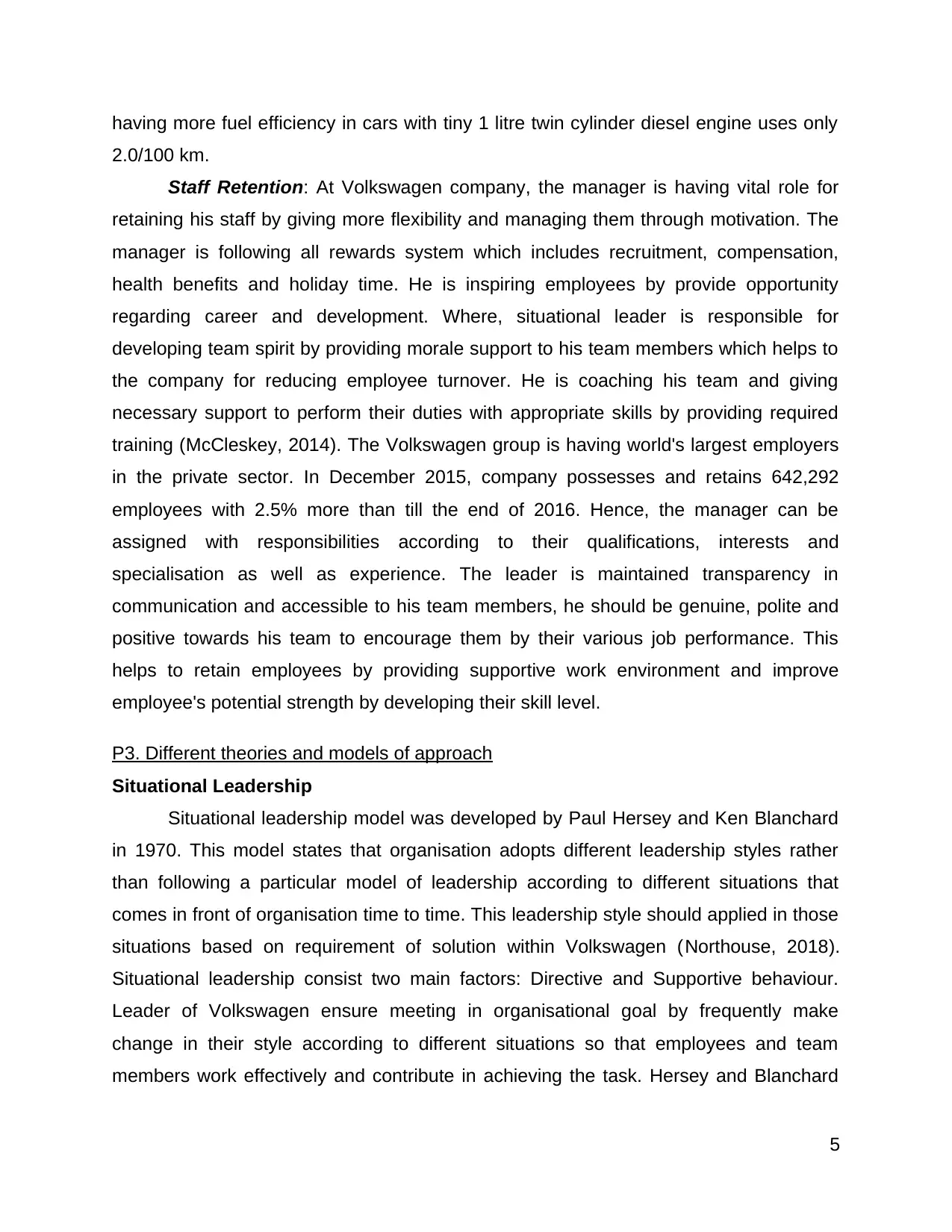
having more fuel efficiency in cars with tiny 1 litre twin cylinder diesel engine uses only
2.0/100 km.
Staff Retention: At Volkswagen company, the manager is having vital role for
retaining his staff by giving more flexibility and managing them through motivation. The
manager is following all rewards system which includes recruitment, compensation,
health benefits and holiday time. He is inspiring employees by provide opportunity
regarding career and development. Where, situational leader is responsible for
developing team spirit by providing morale support to his team members which helps to
the company for reducing employee turnover. He is coaching his team and giving
necessary support to perform their duties with appropriate skills by providing required
training (McCleskey, 2014). The Volkswagen group is having world's largest employers
in the private sector. In December 2015, company possesses and retains 642,292
employees with 2.5% more than till the end of 2016. Hence, the manager can be
assigned with responsibilities according to their qualifications, interests and
specialisation as well as experience. The leader is maintained transparency in
communication and accessible to his team members, he should be genuine, polite and
positive towards his team to encourage them by their various job performance. This
helps to retain employees by providing supportive work environment and improve
employee's potential strength by developing their skill level.
P3. Different theories and models of approach
Situational Leadership
Situational leadership model was developed by Paul Hersey and Ken Blanchard
in 1970. This model states that organisation adopts different leadership styles rather
than following a particular model of leadership according to different situations that
comes in front of organisation time to time. This leadership style should applied in those
situations based on requirement of solution within Volkswagen (Northouse, 2018).
Situational leadership consist two main factors: Directive and Supportive behaviour.
Leader of Volkswagen ensure meeting in organisational goal by frequently make
change in their style according to different situations so that employees and team
members work effectively and contribute in achieving the task. Hersey and Blanchard
5
2.0/100 km.
Staff Retention: At Volkswagen company, the manager is having vital role for
retaining his staff by giving more flexibility and managing them through motivation. The
manager is following all rewards system which includes recruitment, compensation,
health benefits and holiday time. He is inspiring employees by provide opportunity
regarding career and development. Where, situational leader is responsible for
developing team spirit by providing morale support to his team members which helps to
the company for reducing employee turnover. He is coaching his team and giving
necessary support to perform their duties with appropriate skills by providing required
training (McCleskey, 2014). The Volkswagen group is having world's largest employers
in the private sector. In December 2015, company possesses and retains 642,292
employees with 2.5% more than till the end of 2016. Hence, the manager can be
assigned with responsibilities according to their qualifications, interests and
specialisation as well as experience. The leader is maintained transparency in
communication and accessible to his team members, he should be genuine, polite and
positive towards his team to encourage them by their various job performance. This
helps to retain employees by providing supportive work environment and improve
employee's potential strength by developing their skill level.
P3. Different theories and models of approach
Situational Leadership
Situational leadership model was developed by Paul Hersey and Ken Blanchard
in 1970. This model states that organisation adopts different leadership styles rather
than following a particular model of leadership according to different situations that
comes in front of organisation time to time. This leadership style should applied in those
situations based on requirement of solution within Volkswagen (Northouse, 2018).
Situational leadership consist two main factors: Directive and Supportive behaviour.
Leader of Volkswagen ensure meeting in organisational goal by frequently make
change in their style according to different situations so that employees and team
members work effectively and contribute in achieving the task. Hersey and Blanchard
5
Paraphrase This Document
Need a fresh take? Get an instant paraphrase of this document with our AI Paraphraser
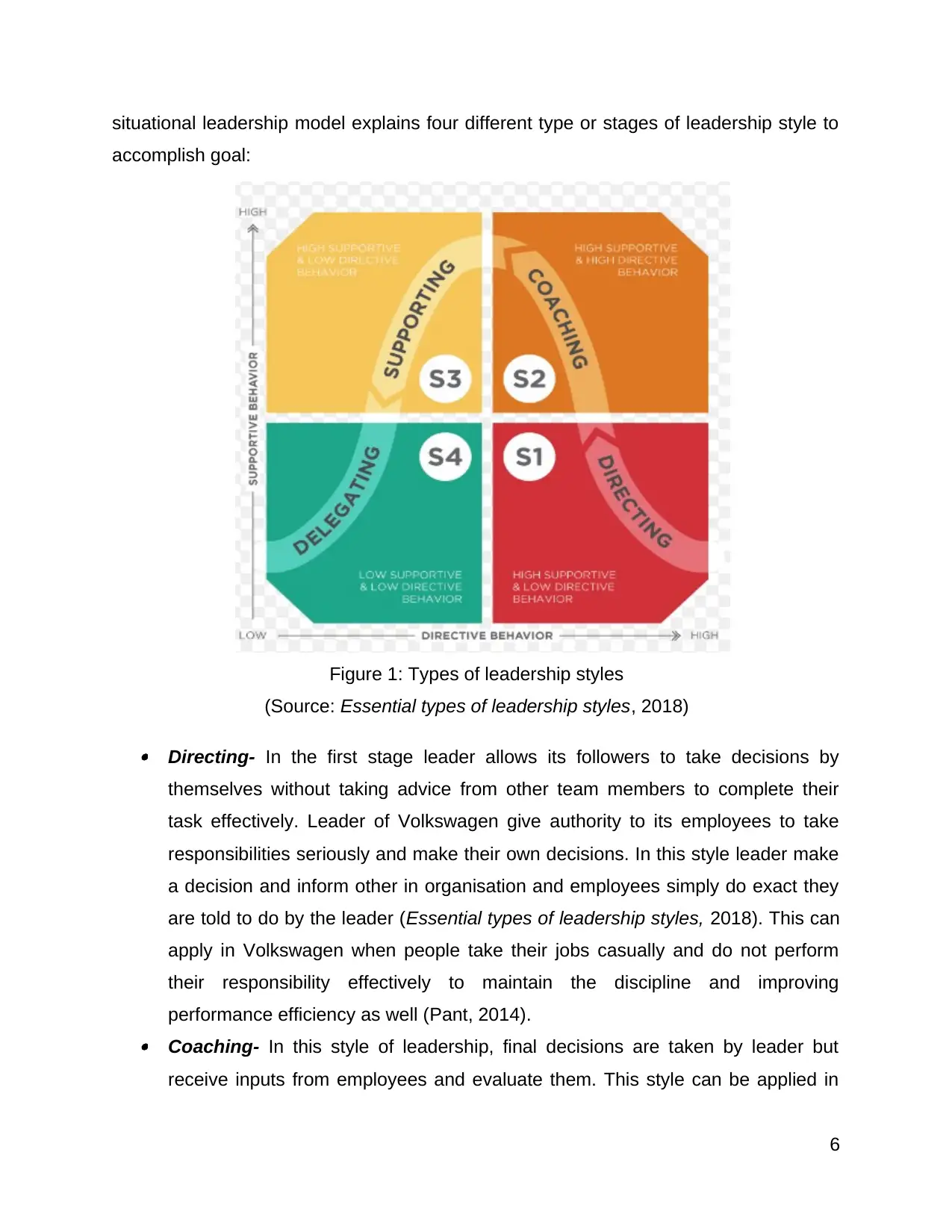
situational leadership model explains four different type or stages of leadership style to
accomplish goal:
Figure 1: Types of leadership styles
(Source: Essential types of leadership styles, 2018)
Directing- In the first stage leader allows its followers to take decisions by
themselves without taking advice from other team members to complete their
task effectively. Leader of Volkswagen give authority to its employees to take
responsibilities seriously and make their own decisions. In this style leader make
a decision and inform other in organisation and employees simply do exact they
are told to do by the leader (Essential types of leadership styles, 2018). This can
apply in Volkswagen when people take their jobs casually and do not perform
their responsibility effectively to maintain the discipline and improving
performance efficiency as well (Pant, 2014). Coaching- In this style of leadership, final decisions are taken by leader but
receive inputs from employees and evaluate them. This style can be applied in
6
accomplish goal:
Figure 1: Types of leadership styles
(Source: Essential types of leadership styles, 2018)
Directing- In the first stage leader allows its followers to take decisions by
themselves without taking advice from other team members to complete their
task effectively. Leader of Volkswagen give authority to its employees to take
responsibilities seriously and make their own decisions. In this style leader make
a decision and inform other in organisation and employees simply do exact they
are told to do by the leader (Essential types of leadership styles, 2018). This can
apply in Volkswagen when people take their jobs casually and do not perform
their responsibility effectively to maintain the discipline and improving
performance efficiency as well (Pant, 2014). Coaching- In this style of leadership, final decisions are taken by leader but
receive inputs from employees and evaluate them. This style can be applied in
6
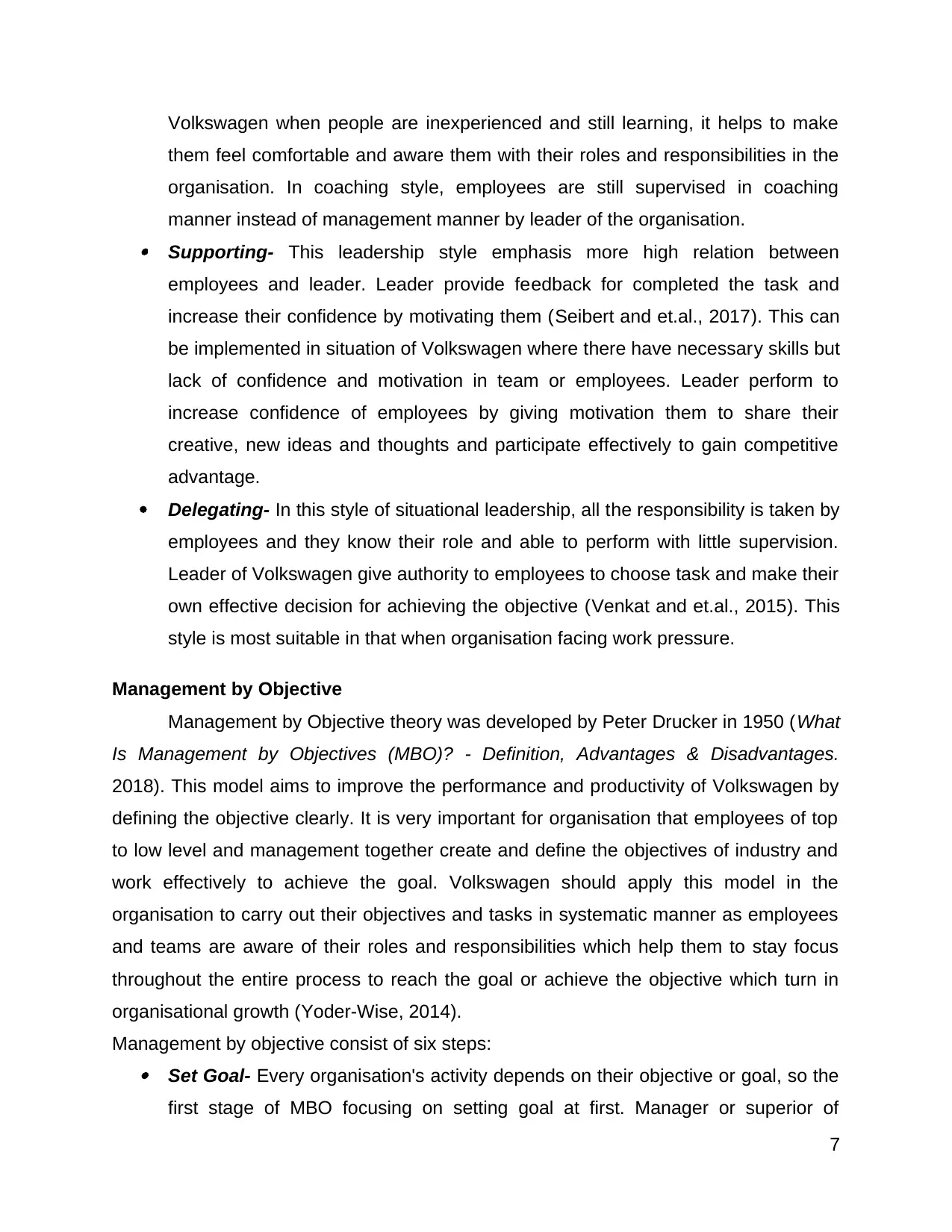
Volkswagen when people are inexperienced and still learning, it helps to make
them feel comfortable and aware them with their roles and responsibilities in the
organisation. In coaching style, employees are still supervised in coaching
manner instead of management manner by leader of the organisation. Supporting- This leadership style emphasis more high relation between
employees and leader. Leader provide feedback for completed the task and
increase their confidence by motivating them (Seibert and et.al., 2017). This can
be implemented in situation of Volkswagen where there have necessary skills but
lack of confidence and motivation in team or employees. Leader perform to
increase confidence of employees by giving motivation them to share their
creative, new ideas and thoughts and participate effectively to gain competitive
advantage.
Delegating- In this style of situational leadership, all the responsibility is taken by
employees and they know their role and able to perform with little supervision.
Leader of Volkswagen give authority to employees to choose task and make their
own effective decision for achieving the objective (Venkat and et.al., 2015). This
style is most suitable in that when organisation facing work pressure.
Management by Objective
Management by Objective theory was developed by Peter Drucker in 1950 (What
Is Management by Objectives (MBO)? - Definition, Advantages & Disadvantages.
2018). This model aims to improve the performance and productivity of Volkswagen by
defining the objective clearly. It is very important for organisation that employees of top
to low level and management together create and define the objectives of industry and
work effectively to achieve the goal. Volkswagen should apply this model in the
organisation to carry out their objectives and tasks in systematic manner as employees
and teams are aware of their roles and responsibilities which help them to stay focus
throughout the entire process to reach the goal or achieve the objective which turn in
organisational growth (Yoder-Wise, 2014).
Management by objective consist of six steps: Set Goal- Every organisation's activity depends on their objective or goal, so the
first stage of MBO focusing on setting goal at first. Manager or superior of
7
them feel comfortable and aware them with their roles and responsibilities in the
organisation. In coaching style, employees are still supervised in coaching
manner instead of management manner by leader of the organisation. Supporting- This leadership style emphasis more high relation between
employees and leader. Leader provide feedback for completed the task and
increase their confidence by motivating them (Seibert and et.al., 2017). This can
be implemented in situation of Volkswagen where there have necessary skills but
lack of confidence and motivation in team or employees. Leader perform to
increase confidence of employees by giving motivation them to share their
creative, new ideas and thoughts and participate effectively to gain competitive
advantage.
Delegating- In this style of situational leadership, all the responsibility is taken by
employees and they know their role and able to perform with little supervision.
Leader of Volkswagen give authority to employees to choose task and make their
own effective decision for achieving the objective (Venkat and et.al., 2015). This
style is most suitable in that when organisation facing work pressure.
Management by Objective
Management by Objective theory was developed by Peter Drucker in 1950 (What
Is Management by Objectives (MBO)? - Definition, Advantages & Disadvantages.
2018). This model aims to improve the performance and productivity of Volkswagen by
defining the objective clearly. It is very important for organisation that employees of top
to low level and management together create and define the objectives of industry and
work effectively to achieve the goal. Volkswagen should apply this model in the
organisation to carry out their objectives and tasks in systematic manner as employees
and teams are aware of their roles and responsibilities which help them to stay focus
throughout the entire process to reach the goal or achieve the objective which turn in
organisational growth (Yoder-Wise, 2014).
Management by objective consist of six steps: Set Goal- Every organisation's activity depends on their objective or goal, so the
first stage of MBO focusing on setting goal at first. Manager or superior of
7
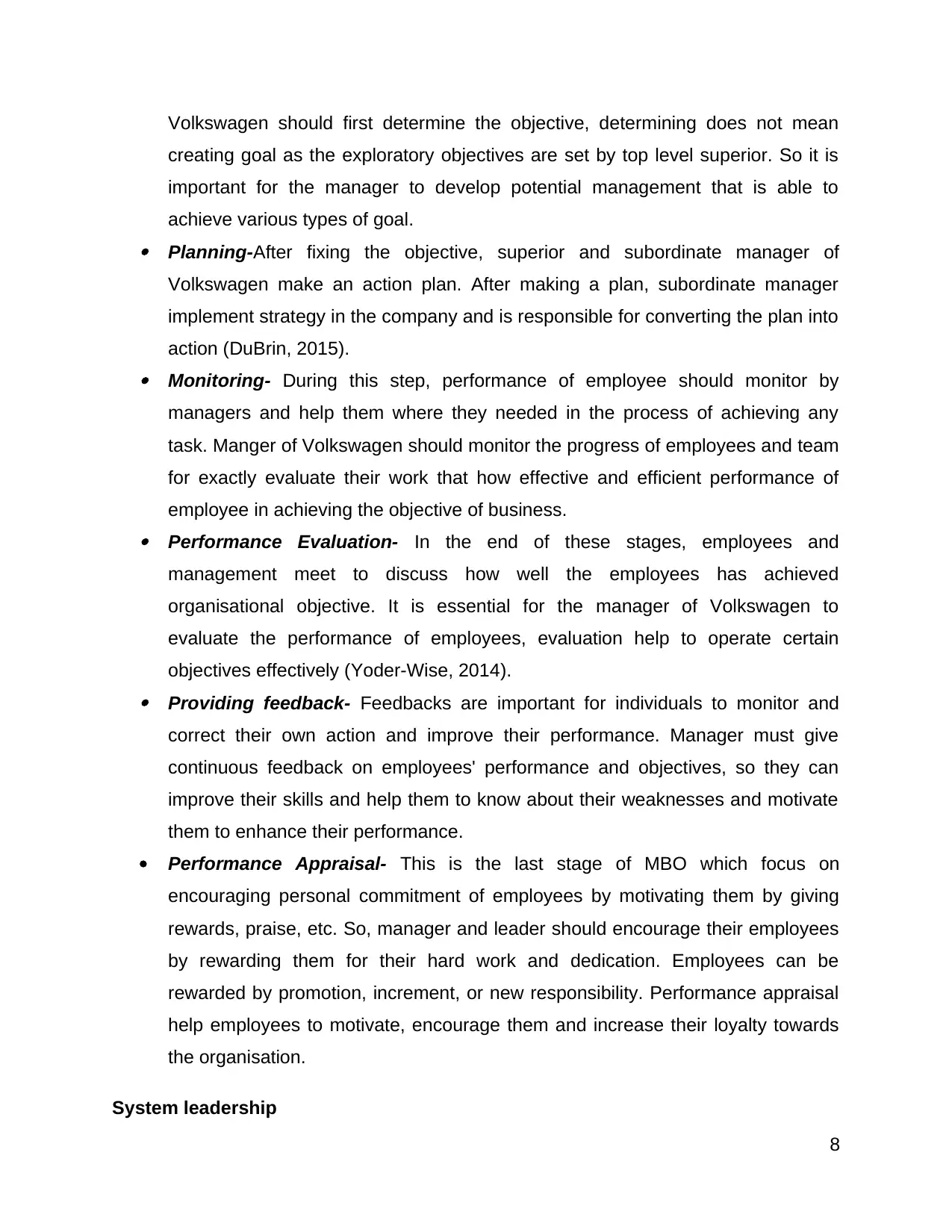
Volkswagen should first determine the objective, determining does not mean
creating goal as the exploratory objectives are set by top level superior. So it is
important for the manager to develop potential management that is able to
achieve various types of goal. Planning-After fixing the objective, superior and subordinate manager of
Volkswagen make an action plan. After making a plan, subordinate manager
implement strategy in the company and is responsible for converting the plan into
action (DuBrin, 2015). Monitoring- During this step, performance of employee should monitor by
managers and help them where they needed in the process of achieving any
task. Manger of Volkswagen should monitor the progress of employees and team
for exactly evaluate their work that how effective and efficient performance of
employee in achieving the objective of business. Performance Evaluation- In the end of these stages, employees and
management meet to discuss how well the employees has achieved
organisational objective. It is essential for the manager of Volkswagen to
evaluate the performance of employees, evaluation help to operate certain
objectives effectively (Yoder-Wise, 2014). Providing feedback- Feedbacks are important for individuals to monitor and
correct their own action and improve their performance. Manager must give
continuous feedback on employees' performance and objectives, so they can
improve their skills and help them to know about their weaknesses and motivate
them to enhance their performance.
Performance Appraisal- This is the last stage of MBO which focus on
encouraging personal commitment of employees by motivating them by giving
rewards, praise, etc. So, manager and leader should encourage their employees
by rewarding them for their hard work and dedication. Employees can be
rewarded by promotion, increment, or new responsibility. Performance appraisal
help employees to motivate, encourage them and increase their loyalty towards
the organisation.
System leadership
8
creating goal as the exploratory objectives are set by top level superior. So it is
important for the manager to develop potential management that is able to
achieve various types of goal. Planning-After fixing the objective, superior and subordinate manager of
Volkswagen make an action plan. After making a plan, subordinate manager
implement strategy in the company and is responsible for converting the plan into
action (DuBrin, 2015). Monitoring- During this step, performance of employee should monitor by
managers and help them where they needed in the process of achieving any
task. Manger of Volkswagen should monitor the progress of employees and team
for exactly evaluate their work that how effective and efficient performance of
employee in achieving the objective of business. Performance Evaluation- In the end of these stages, employees and
management meet to discuss how well the employees has achieved
organisational objective. It is essential for the manager of Volkswagen to
evaluate the performance of employees, evaluation help to operate certain
objectives effectively (Yoder-Wise, 2014). Providing feedback- Feedbacks are important for individuals to monitor and
correct their own action and improve their performance. Manager must give
continuous feedback on employees' performance and objectives, so they can
improve their skills and help them to know about their weaknesses and motivate
them to enhance their performance.
Performance Appraisal- This is the last stage of MBO which focus on
encouraging personal commitment of employees by motivating them by giving
rewards, praise, etc. So, manager and leader should encourage their employees
by rewarding them for their hard work and dedication. Employees can be
rewarded by promotion, increment, or new responsibility. Performance appraisal
help employees to motivate, encourage them and increase their loyalty towards
the organisation.
System leadership
8
Secure Best Marks with AI Grader
Need help grading? Try our AI Grader for instant feedback on your assignments.
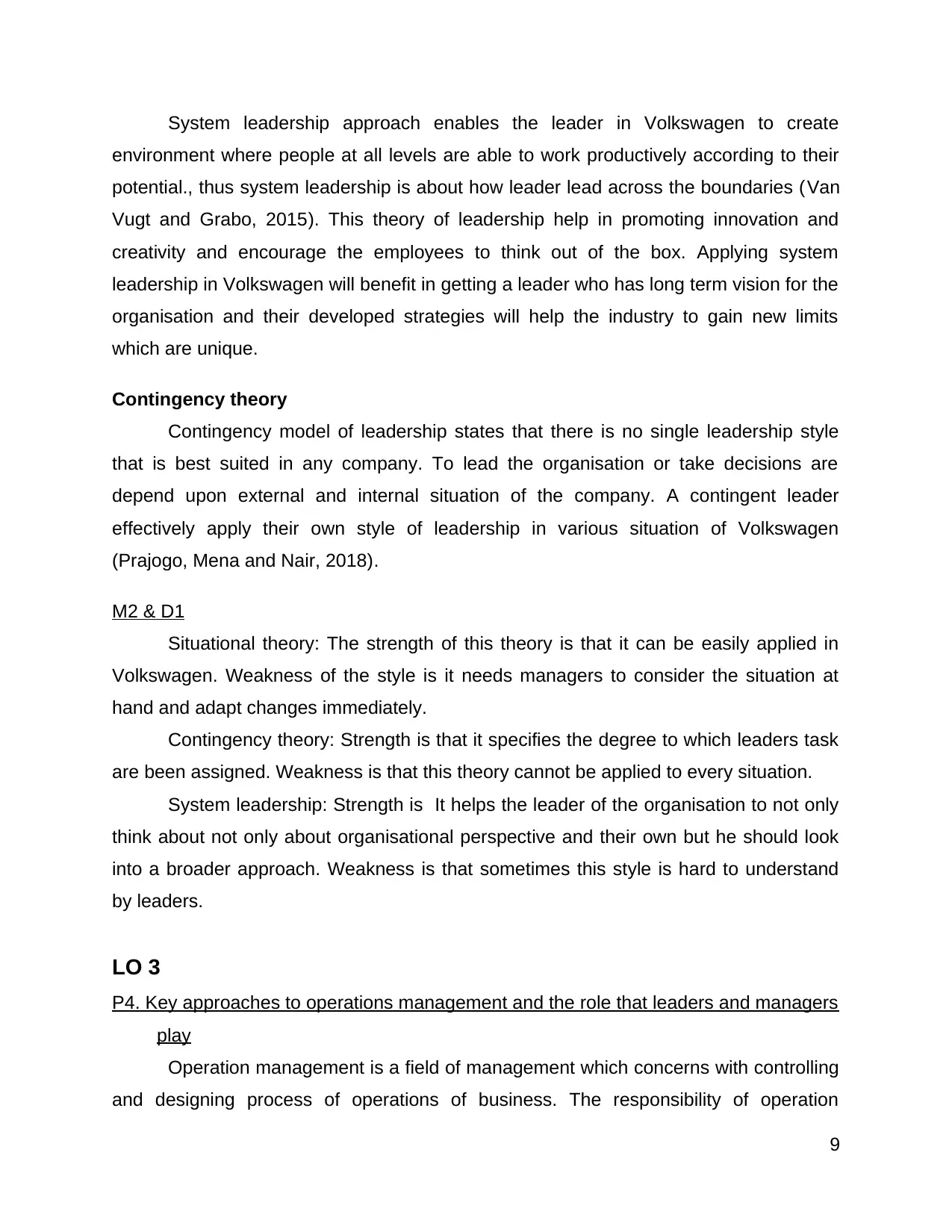
System leadership approach enables the leader in Volkswagen to create
environment where people at all levels are able to work productively according to their
potential., thus system leadership is about how leader lead across the boundaries (Van
Vugt and Grabo, 2015). This theory of leadership help in promoting innovation and
creativity and encourage the employees to think out of the box. Applying system
leadership in Volkswagen will benefit in getting a leader who has long term vision for the
organisation and their developed strategies will help the industry to gain new limits
which are unique.
Contingency theory
Contingency model of leadership states that there is no single leadership style
that is best suited in any company. To lead the organisation or take decisions are
depend upon external and internal situation of the company. A contingent leader
effectively apply their own style of leadership in various situation of Volkswagen
(Prajogo, Mena and Nair, 2018).
M2 & D1
Situational theory: The strength of this theory is that it can be easily applied in
Volkswagen. Weakness of the style is it needs managers to consider the situation at
hand and adapt changes immediately.
Contingency theory: Strength is that it specifies the degree to which leaders task
are been assigned. Weakness is that this theory cannot be applied to every situation.
System leadership: Strength is It helps the leader of the organisation to not only
think about not only about organisational perspective and their own but he should look
into a broader approach. Weakness is that sometimes this style is hard to understand
by leaders.
LO 3
P4. Key approaches to operations management and the role that leaders and managers
play
Operation management is a field of management which concerns with controlling
and designing process of operations of business. The responsibility of operation
9
environment where people at all levels are able to work productively according to their
potential., thus system leadership is about how leader lead across the boundaries (Van
Vugt and Grabo, 2015). This theory of leadership help in promoting innovation and
creativity and encourage the employees to think out of the box. Applying system
leadership in Volkswagen will benefit in getting a leader who has long term vision for the
organisation and their developed strategies will help the industry to gain new limits
which are unique.
Contingency theory
Contingency model of leadership states that there is no single leadership style
that is best suited in any company. To lead the organisation or take decisions are
depend upon external and internal situation of the company. A contingent leader
effectively apply their own style of leadership in various situation of Volkswagen
(Prajogo, Mena and Nair, 2018).
M2 & D1
Situational theory: The strength of this theory is that it can be easily applied in
Volkswagen. Weakness of the style is it needs managers to consider the situation at
hand and adapt changes immediately.
Contingency theory: Strength is that it specifies the degree to which leaders task
are been assigned. Weakness is that this theory cannot be applied to every situation.
System leadership: Strength is It helps the leader of the organisation to not only
think about not only about organisational perspective and their own but he should look
into a broader approach. Weakness is that sometimes this style is hard to understand
by leaders.
LO 3
P4. Key approaches to operations management and the role that leaders and managers
play
Operation management is a field of management which concerns with controlling
and designing process of operations of business. The responsibility of operation
9
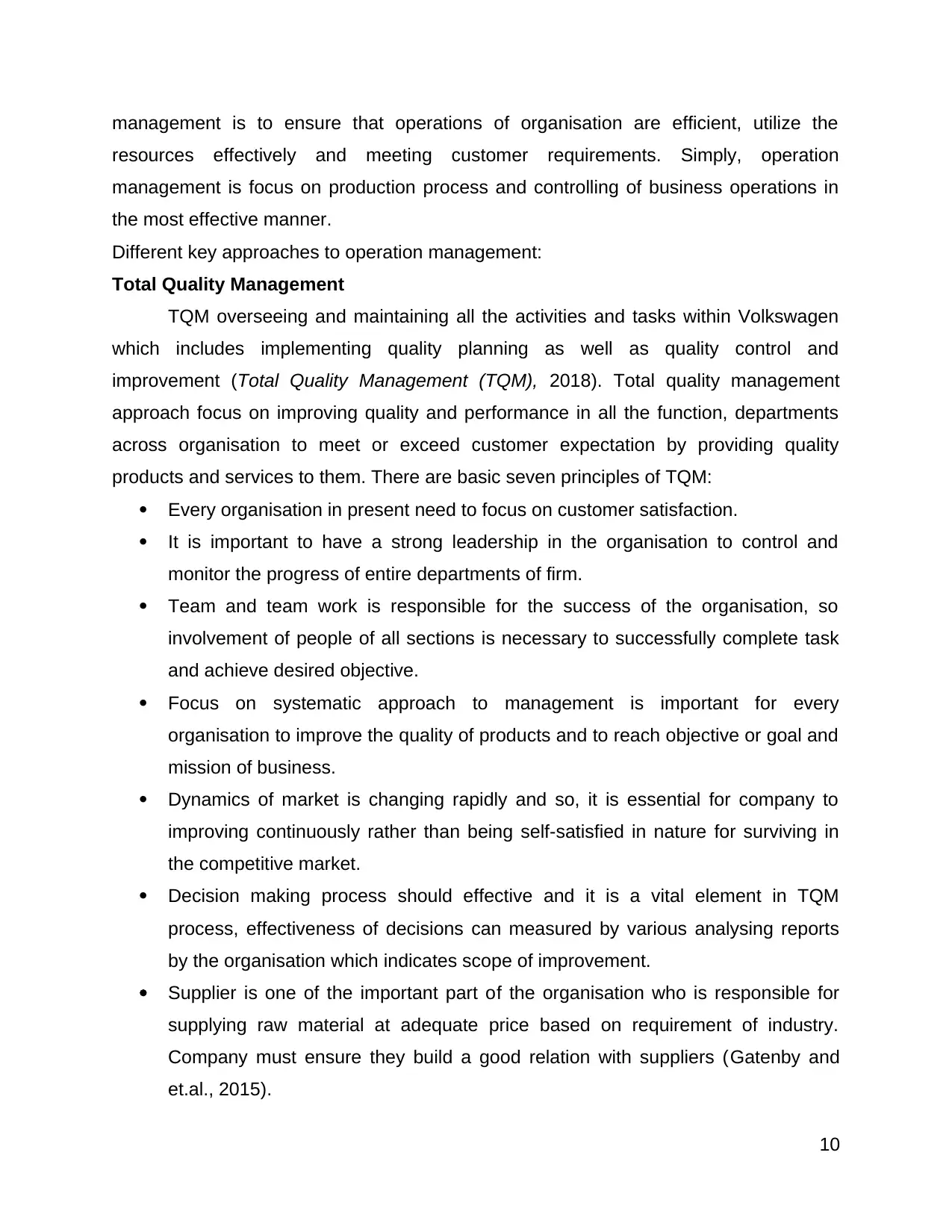
management is to ensure that operations of organisation are efficient, utilize the
resources effectively and meeting customer requirements. Simply, operation
management is focus on production process and controlling of business operations in
the most effective manner.
Different key approaches to operation management:
Total Quality Management
TQM overseeing and maintaining all the activities and tasks within Volkswagen
which includes implementing quality planning as well as quality control and
improvement (Total Quality Management (TQM), 2018). Total quality management
approach focus on improving quality and performance in all the function, departments
across organisation to meet or exceed customer expectation by providing quality
products and services to them. There are basic seven principles of TQM:
Every organisation in present need to focus on customer satisfaction.
It is important to have a strong leadership in the organisation to control and
monitor the progress of entire departments of firm.
Team and team work is responsible for the success of the organisation, so
involvement of people of all sections is necessary to successfully complete task
and achieve desired objective.
Focus on systematic approach to management is important for every
organisation to improve the quality of products and to reach objective or goal and
mission of business.
Dynamics of market is changing rapidly and so, it is essential for company to
improving continuously rather than being self-satisfied in nature for surviving in
the competitive market.
Decision making process should effective and it is a vital element in TQM
process, effectiveness of decisions can measured by various analysing reports
by the organisation which indicates scope of improvement.
Supplier is one of the important part of the organisation who is responsible for
supplying raw material at adequate price based on requirement of industry.
Company must ensure they build a good relation with suppliers (Gatenby and
et.al., 2015).
10
resources effectively and meeting customer requirements. Simply, operation
management is focus on production process and controlling of business operations in
the most effective manner.
Different key approaches to operation management:
Total Quality Management
TQM overseeing and maintaining all the activities and tasks within Volkswagen
which includes implementing quality planning as well as quality control and
improvement (Total Quality Management (TQM), 2018). Total quality management
approach focus on improving quality and performance in all the function, departments
across organisation to meet or exceed customer expectation by providing quality
products and services to them. There are basic seven principles of TQM:
Every organisation in present need to focus on customer satisfaction.
It is important to have a strong leadership in the organisation to control and
monitor the progress of entire departments of firm.
Team and team work is responsible for the success of the organisation, so
involvement of people of all sections is necessary to successfully complete task
and achieve desired objective.
Focus on systematic approach to management is important for every
organisation to improve the quality of products and to reach objective or goal and
mission of business.
Dynamics of market is changing rapidly and so, it is essential for company to
improving continuously rather than being self-satisfied in nature for surviving in
the competitive market.
Decision making process should effective and it is a vital element in TQM
process, effectiveness of decisions can measured by various analysing reports
by the organisation which indicates scope of improvement.
Supplier is one of the important part of the organisation who is responsible for
supplying raw material at adequate price based on requirement of industry.
Company must ensure they build a good relation with suppliers (Gatenby and
et.al., 2015).
10
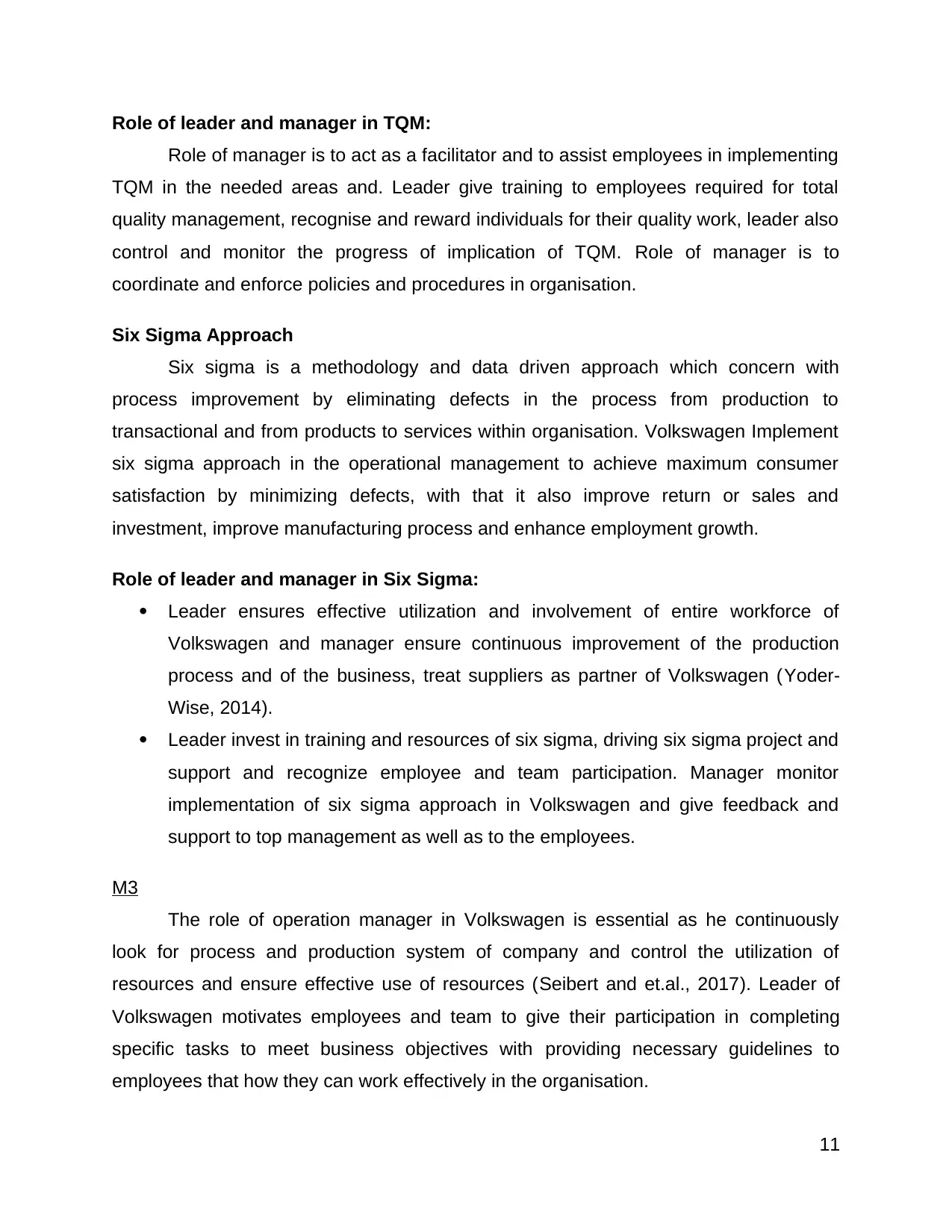
Role of leader and manager in TQM:
Role of manager is to act as a facilitator and to assist employees in implementing
TQM in the needed areas and. Leader give training to employees required for total
quality management, recognise and reward individuals for their quality work, leader also
control and monitor the progress of implication of TQM. Role of manager is to
coordinate and enforce policies and procedures in organisation.
Six Sigma Approach
Six sigma is a methodology and data driven approach which concern with
process improvement by eliminating defects in the process from production to
transactional and from products to services within organisation. Volkswagen Implement
six sigma approach in the operational management to achieve maximum consumer
satisfaction by minimizing defects, with that it also improve return or sales and
investment, improve manufacturing process and enhance employment growth.
Role of leader and manager in Six Sigma:
Leader ensures effective utilization and involvement of entire workforce of
Volkswagen and manager ensure continuous improvement of the production
process and of the business, treat suppliers as partner of Volkswagen (Yoder-
Wise, 2014).
Leader invest in training and resources of six sigma, driving six sigma project and
support and recognize employee and team participation. Manager monitor
implementation of six sigma approach in Volkswagen and give feedback and
support to top management as well as to the employees.
M3
The role of operation manager in Volkswagen is essential as he continuously
look for process and production system of company and control the utilization of
resources and ensure effective use of resources (Seibert and et.al., 2017). Leader of
Volkswagen motivates employees and team to give their participation in completing
specific tasks to meet business objectives with providing necessary guidelines to
employees that how they can work effectively in the organisation.
11
Role of manager is to act as a facilitator and to assist employees in implementing
TQM in the needed areas and. Leader give training to employees required for total
quality management, recognise and reward individuals for their quality work, leader also
control and monitor the progress of implication of TQM. Role of manager is to
coordinate and enforce policies and procedures in organisation.
Six Sigma Approach
Six sigma is a methodology and data driven approach which concern with
process improvement by eliminating defects in the process from production to
transactional and from products to services within organisation. Volkswagen Implement
six sigma approach in the operational management to achieve maximum consumer
satisfaction by minimizing defects, with that it also improve return or sales and
investment, improve manufacturing process and enhance employment growth.
Role of leader and manager in Six Sigma:
Leader ensures effective utilization and involvement of entire workforce of
Volkswagen and manager ensure continuous improvement of the production
process and of the business, treat suppliers as partner of Volkswagen (Yoder-
Wise, 2014).
Leader invest in training and resources of six sigma, driving six sigma project and
support and recognize employee and team participation. Manager monitor
implementation of six sigma approach in Volkswagen and give feedback and
support to top management as well as to the employees.
M3
The role of operation manager in Volkswagen is essential as he continuously
look for process and production system of company and control the utilization of
resources and ensure effective use of resources (Seibert and et.al., 2017). Leader of
Volkswagen motivates employees and team to give their participation in completing
specific tasks to meet business objectives with providing necessary guidelines to
employees that how they can work effectively in the organisation.
11
Paraphrase This Document
Need a fresh take? Get an instant paraphrase of this document with our AI Paraphraser
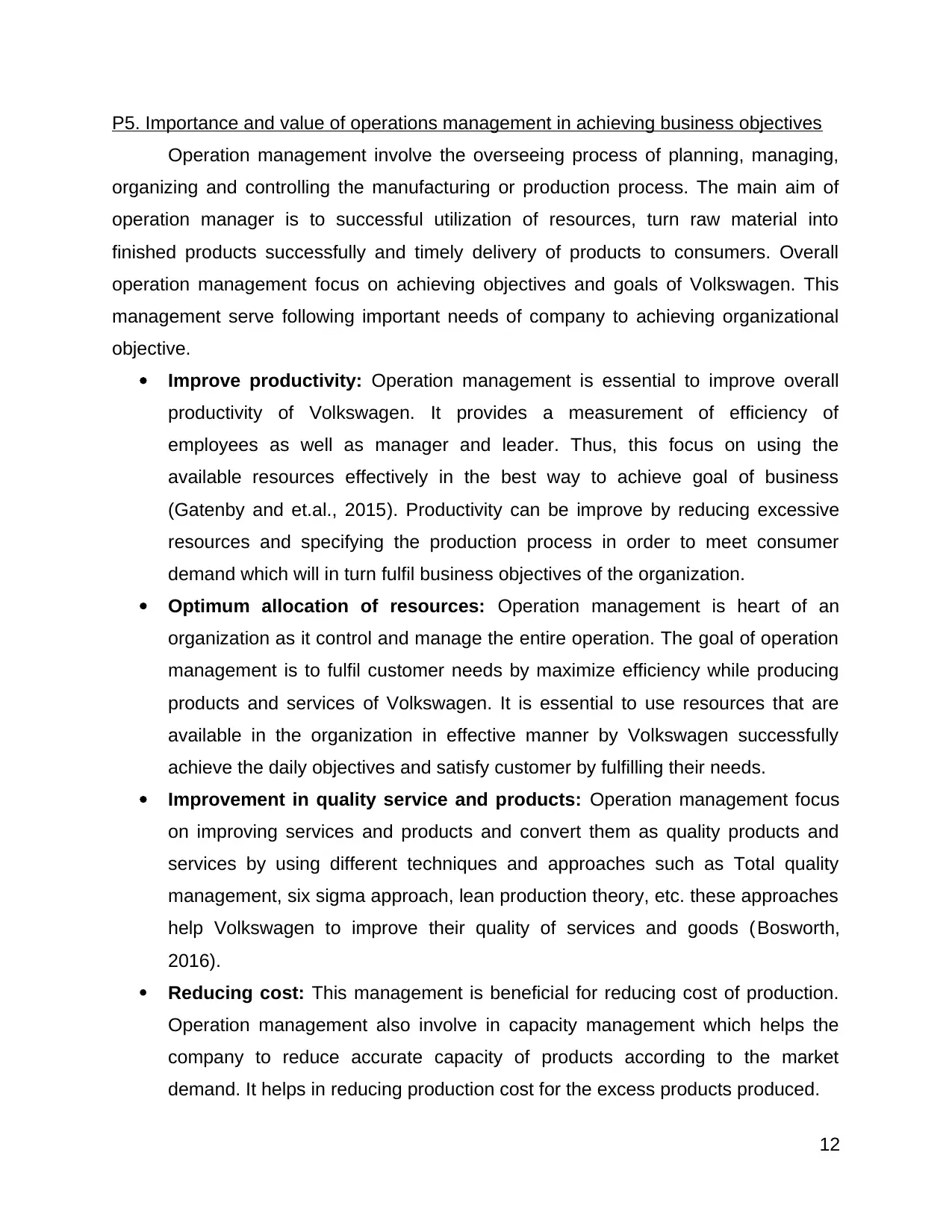
P5. Importance and value of operations management in achieving business objectives
Operation management involve the overseeing process of planning, managing,
organizing and controlling the manufacturing or production process. The main aim of
operation manager is to successful utilization of resources, turn raw material into
finished products successfully and timely delivery of products to consumers. Overall
operation management focus on achieving objectives and goals of Volkswagen. This
management serve following important needs of company to achieving organizational
objective.
Improve productivity: Operation management is essential to improve overall
productivity of Volkswagen. It provides a measurement of efficiency of
employees as well as manager and leader. Thus, this focus on using the
available resources effectively in the best way to achieve goal of business
(Gatenby and et.al., 2015). Productivity can be improve by reducing excessive
resources and specifying the production process in order to meet consumer
demand which will in turn fulfil business objectives of the organization.
Optimum allocation of resources: Operation management is heart of an
organization as it control and manage the entire operation. The goal of operation
management is to fulfil customer needs by maximize efficiency while producing
products and services of Volkswagen. It is essential to use resources that are
available in the organization in effective manner by Volkswagen successfully
achieve the daily objectives and satisfy customer by fulfilling their needs.
Improvement in quality service and products: Operation management focus
on improving services and products and convert them as quality products and
services by using different techniques and approaches such as Total quality
management, six sigma approach, lean production theory, etc. these approaches
help Volkswagen to improve their quality of services and goods (Bosworth,
2016).
Reducing cost: This management is beneficial for reducing cost of production.
Operation management also involve in capacity management which helps the
company to reduce accurate capacity of products according to the market
demand. It helps in reducing production cost for the excess products produced.
12
Operation management involve the overseeing process of planning, managing,
organizing and controlling the manufacturing or production process. The main aim of
operation manager is to successful utilization of resources, turn raw material into
finished products successfully and timely delivery of products to consumers. Overall
operation management focus on achieving objectives and goals of Volkswagen. This
management serve following important needs of company to achieving organizational
objective.
Improve productivity: Operation management is essential to improve overall
productivity of Volkswagen. It provides a measurement of efficiency of
employees as well as manager and leader. Thus, this focus on using the
available resources effectively in the best way to achieve goal of business
(Gatenby and et.al., 2015). Productivity can be improve by reducing excessive
resources and specifying the production process in order to meet consumer
demand which will in turn fulfil business objectives of the organization.
Optimum allocation of resources: Operation management is heart of an
organization as it control and manage the entire operation. The goal of operation
management is to fulfil customer needs by maximize efficiency while producing
products and services of Volkswagen. It is essential to use resources that are
available in the organization in effective manner by Volkswagen successfully
achieve the daily objectives and satisfy customer by fulfilling their needs.
Improvement in quality service and products: Operation management focus
on improving services and products and convert them as quality products and
services by using different techniques and approaches such as Total quality
management, six sigma approach, lean production theory, etc. these approaches
help Volkswagen to improve their quality of services and goods (Bosworth,
2016).
Reducing cost: This management is beneficial for reducing cost of production.
Operation management also involve in capacity management which helps the
company to reduce accurate capacity of products according to the market
demand. It helps in reducing production cost for the excess products produced.
12
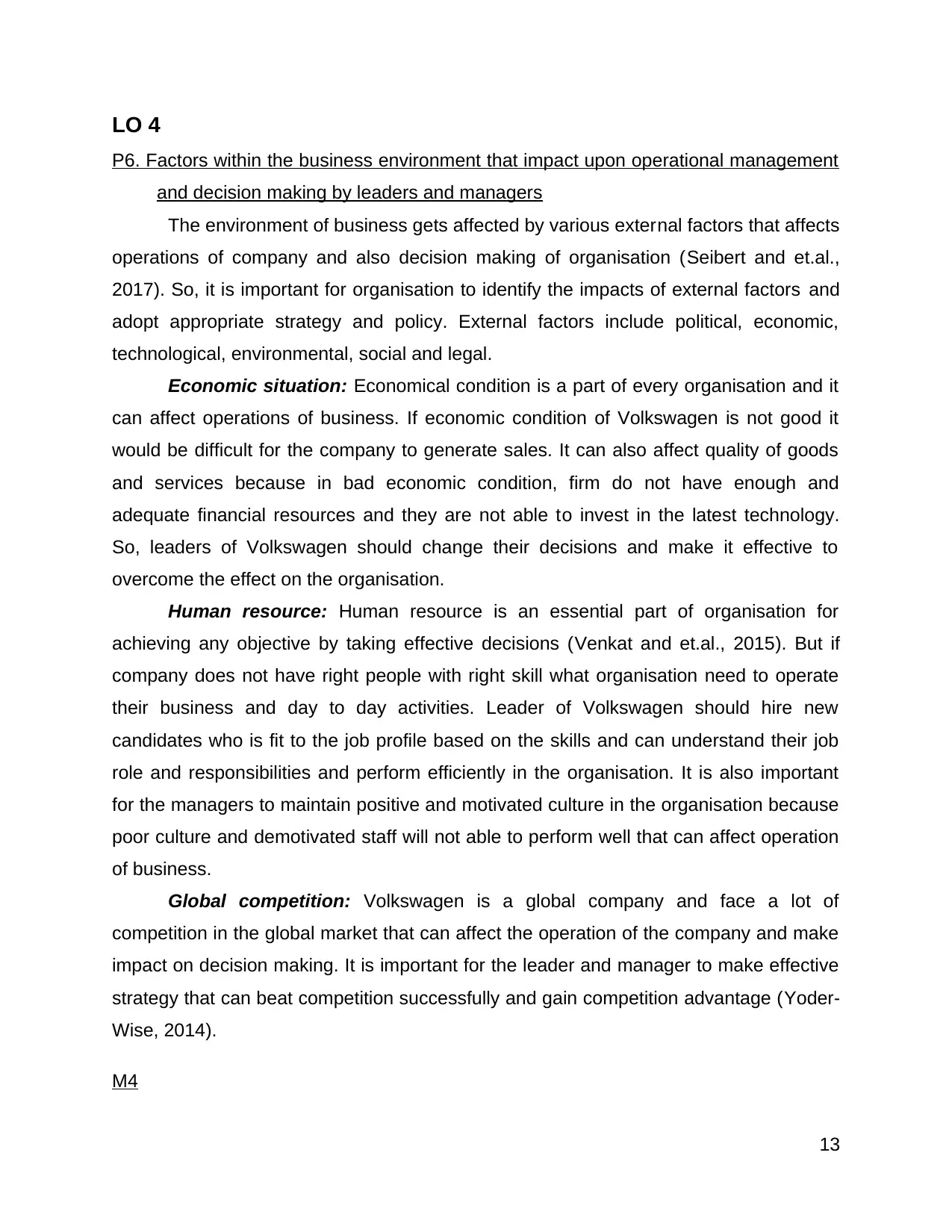
LO 4
P6. Factors within the business environment that impact upon operational management
and decision making by leaders and managers
The environment of business gets affected by various external factors that affects
operations of company and also decision making of organisation (Seibert and et.al.,
2017). So, it is important for organisation to identify the impacts of external factors and
adopt appropriate strategy and policy. External factors include political, economic,
technological, environmental, social and legal.
Economic situation: Economical condition is a part of every organisation and it
can affect operations of business. If economic condition of Volkswagen is not good it
would be difficult for the company to generate sales. It can also affect quality of goods
and services because in bad economic condition, firm do not have enough and
adequate financial resources and they are not able to invest in the latest technology.
So, leaders of Volkswagen should change their decisions and make it effective to
overcome the effect on the organisation.
Human resource: Human resource is an essential part of organisation for
achieving any objective by taking effective decisions (Venkat and et.al., 2015). But if
company does not have right people with right skill what organisation need to operate
their business and day to day activities. Leader of Volkswagen should hire new
candidates who is fit to the job profile based on the skills and can understand their job
role and responsibilities and perform efficiently in the organisation. It is also important
for the managers to maintain positive and motivated culture in the organisation because
poor culture and demotivated staff will not able to perform well that can affect operation
of business.
Global competition: Volkswagen is a global company and face a lot of
competition in the global market that can affect the operation of the company and make
impact on decision making. It is important for the leader and manager to make effective
strategy that can beat competition successfully and gain competition advantage (Yoder-
Wise, 2014).
M4
13
P6. Factors within the business environment that impact upon operational management
and decision making by leaders and managers
The environment of business gets affected by various external factors that affects
operations of company and also decision making of organisation (Seibert and et.al.,
2017). So, it is important for organisation to identify the impacts of external factors and
adopt appropriate strategy and policy. External factors include political, economic,
technological, environmental, social and legal.
Economic situation: Economical condition is a part of every organisation and it
can affect operations of business. If economic condition of Volkswagen is not good it
would be difficult for the company to generate sales. It can also affect quality of goods
and services because in bad economic condition, firm do not have enough and
adequate financial resources and they are not able to invest in the latest technology.
So, leaders of Volkswagen should change their decisions and make it effective to
overcome the effect on the organisation.
Human resource: Human resource is an essential part of organisation for
achieving any objective by taking effective decisions (Venkat and et.al., 2015). But if
company does not have right people with right skill what organisation need to operate
their business and day to day activities. Leader of Volkswagen should hire new
candidates who is fit to the job profile based on the skills and can understand their job
role and responsibilities and perform efficiently in the organisation. It is also important
for the managers to maintain positive and motivated culture in the organisation because
poor culture and demotivated staff will not able to perform well that can affect operation
of business.
Global competition: Volkswagen is a global company and face a lot of
competition in the global market that can affect the operation of the company and make
impact on decision making. It is important for the leader and manager to make effective
strategy that can beat competition successfully and gain competition advantage (Yoder-
Wise, 2014).
M4
13
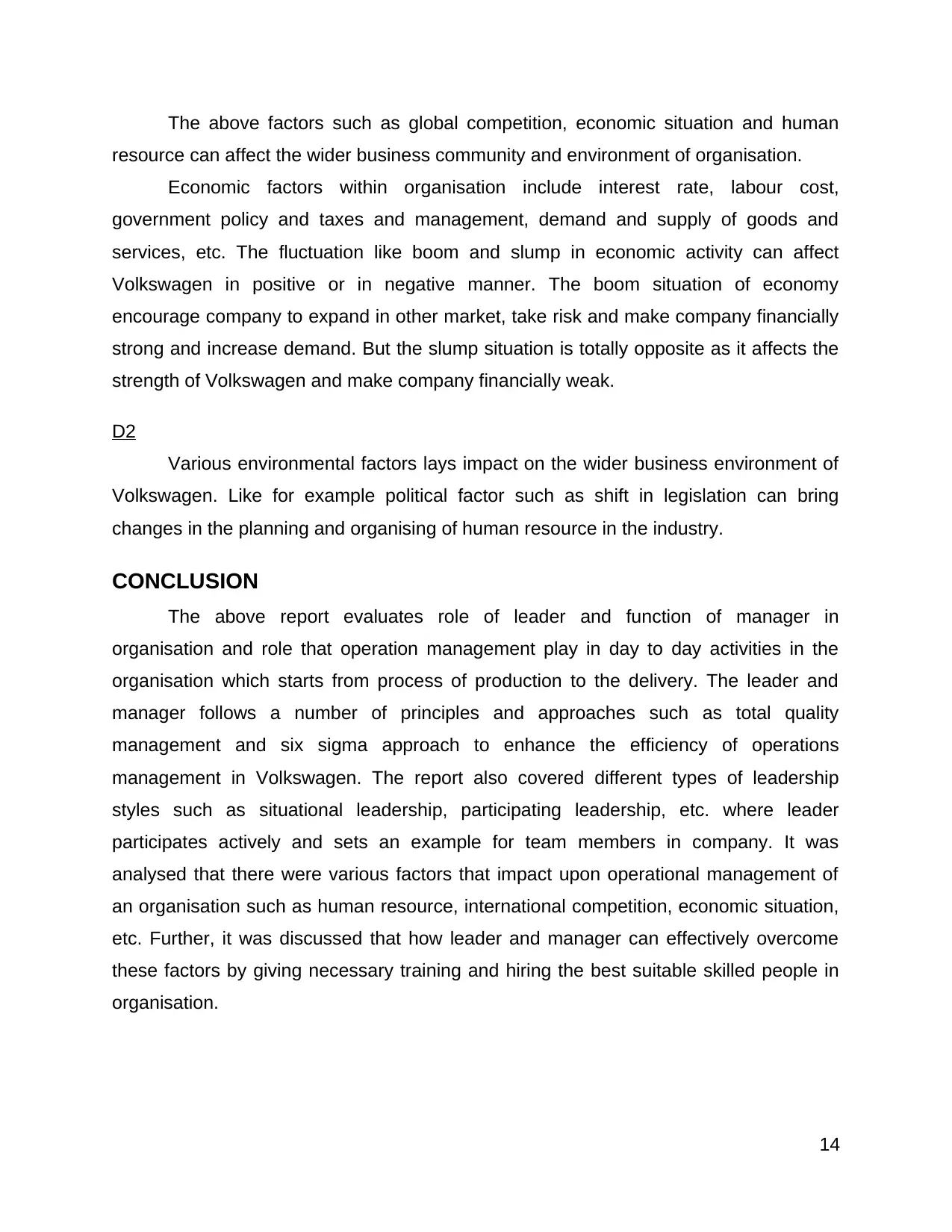
The above factors such as global competition, economic situation and human
resource can affect the wider business community and environment of organisation.
Economic factors within organisation include interest rate, labour cost,
government policy and taxes and management, demand and supply of goods and
services, etc. The fluctuation like boom and slump in economic activity can affect
Volkswagen in positive or in negative manner. The boom situation of economy
encourage company to expand in other market, take risk and make company financially
strong and increase demand. But the slump situation is totally opposite as it affects the
strength of Volkswagen and make company financially weak.
D2
Various environmental factors lays impact on the wider business environment of
Volkswagen. Like for example political factor such as shift in legislation can bring
changes in the planning and organising of human resource in the industry.
CONCLUSION
The above report evaluates role of leader and function of manager in
organisation and role that operation management play in day to day activities in the
organisation which starts from process of production to the delivery. The leader and
manager follows a number of principles and approaches such as total quality
management and six sigma approach to enhance the efficiency of operations
management in Volkswagen. The report also covered different types of leadership
styles such as situational leadership, participating leadership, etc. where leader
participates actively and sets an example for team members in company. It was
analysed that there were various factors that impact upon operational management of
an organisation such as human resource, international competition, economic situation,
etc. Further, it was discussed that how leader and manager can effectively overcome
these factors by giving necessary training and hiring the best suitable skilled people in
organisation.
14
resource can affect the wider business community and environment of organisation.
Economic factors within organisation include interest rate, labour cost,
government policy and taxes and management, demand and supply of goods and
services, etc. The fluctuation like boom and slump in economic activity can affect
Volkswagen in positive or in negative manner. The boom situation of economy
encourage company to expand in other market, take risk and make company financially
strong and increase demand. But the slump situation is totally opposite as it affects the
strength of Volkswagen and make company financially weak.
D2
Various environmental factors lays impact on the wider business environment of
Volkswagen. Like for example political factor such as shift in legislation can bring
changes in the planning and organising of human resource in the industry.
CONCLUSION
The above report evaluates role of leader and function of manager in
organisation and role that operation management play in day to day activities in the
organisation which starts from process of production to the delivery. The leader and
manager follows a number of principles and approaches such as total quality
management and six sigma approach to enhance the efficiency of operations
management in Volkswagen. The report also covered different types of leadership
styles such as situational leadership, participating leadership, etc. where leader
participates actively and sets an example for team members in company. It was
analysed that there were various factors that impact upon operational management of
an organisation such as human resource, international competition, economic situation,
etc. Further, it was discussed that how leader and manager can effectively overcome
these factors by giving necessary training and hiring the best suitable skilled people in
organisation.
14
Secure Best Marks with AI Grader
Need help grading? Try our AI Grader for instant feedback on your assignments.
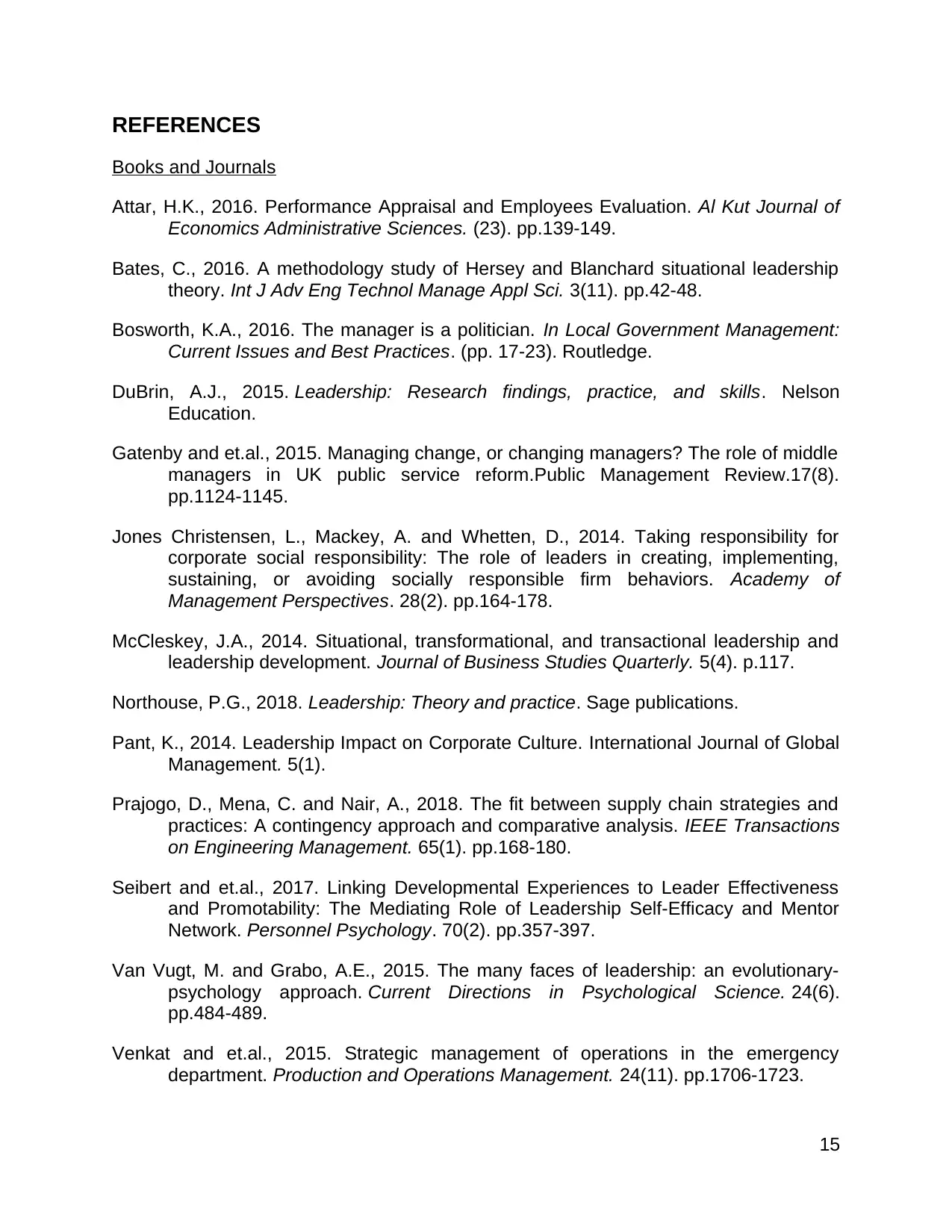
REFERENCES
Books and Journals
Attar, H.K., 2016. Performance Appraisal and Employees Evaluation. Al Kut Journal of
Economics Administrative Sciences. (23). pp.139-149.
Bates, C., 2016. A methodology study of Hersey and Blanchard situational leadership
theory. Int J Adv Eng Technol Manage Appl Sci. 3(11). pp.42-48.
Bosworth, K.A., 2016. The manager is a politician. In Local Government Management:
Current Issues and Best Practices. (pp. 17-23). Routledge.
DuBrin, A.J., 2015. Leadership: Research findings, practice, and skills. Nelson
Education.
Gatenby and et.al., 2015. Managing change, or changing managers? The role of middle
managers in UK public service reform.Public Management Review.17(8).
pp.1124-1145.
Jones Christensen, L., Mackey, A. and Whetten, D., 2014. Taking responsibility for
corporate social responsibility: The role of leaders in creating, implementing,
sustaining, or avoiding socially responsible firm behaviors. Academy of
Management Perspectives. 28(2). pp.164-178.
McCleskey, J.A., 2014. Situational, transformational, and transactional leadership and
leadership development. Journal of Business Studies Quarterly. 5(4). p.117.
Northouse, P.G., 2018. Leadership: Theory and practice. Sage publications.
Pant, K., 2014. Leadership Impact on Corporate Culture. International Journal of Global
Management. 5(1).
Prajogo, D., Mena, C. and Nair, A., 2018. The fit between supply chain strategies and
practices: A contingency approach and comparative analysis. IEEE Transactions
on Engineering Management. 65(1). pp.168-180.
Seibert and et.al., 2017. Linking Developmental Experiences to Leader Effectiveness
and Promotability: The Mediating Role of Leadership Self‐Efficacy and Mentor
Network. Personnel Psychology. 70(2). pp.357-397.
Van Vugt, M. and Grabo, A.E., 2015. The many faces of leadership: an evolutionary-
psychology approach. Current Directions in Psychological Science. 24(6).
pp.484-489.
Venkat and et.al., 2015. Strategic management of operations in the emergency
department. Production and Operations Management. 24(11). pp.1706-1723.
15
Books and Journals
Attar, H.K., 2016. Performance Appraisal and Employees Evaluation. Al Kut Journal of
Economics Administrative Sciences. (23). pp.139-149.
Bates, C., 2016. A methodology study of Hersey and Blanchard situational leadership
theory. Int J Adv Eng Technol Manage Appl Sci. 3(11). pp.42-48.
Bosworth, K.A., 2016. The manager is a politician. In Local Government Management:
Current Issues and Best Practices. (pp. 17-23). Routledge.
DuBrin, A.J., 2015. Leadership: Research findings, practice, and skills. Nelson
Education.
Gatenby and et.al., 2015. Managing change, or changing managers? The role of middle
managers in UK public service reform.Public Management Review.17(8).
pp.1124-1145.
Jones Christensen, L., Mackey, A. and Whetten, D., 2014. Taking responsibility for
corporate social responsibility: The role of leaders in creating, implementing,
sustaining, or avoiding socially responsible firm behaviors. Academy of
Management Perspectives. 28(2). pp.164-178.
McCleskey, J.A., 2014. Situational, transformational, and transactional leadership and
leadership development. Journal of Business Studies Quarterly. 5(4). p.117.
Northouse, P.G., 2018. Leadership: Theory and practice. Sage publications.
Pant, K., 2014. Leadership Impact on Corporate Culture. International Journal of Global
Management. 5(1).
Prajogo, D., Mena, C. and Nair, A., 2018. The fit between supply chain strategies and
practices: A contingency approach and comparative analysis. IEEE Transactions
on Engineering Management. 65(1). pp.168-180.
Seibert and et.al., 2017. Linking Developmental Experiences to Leader Effectiveness
and Promotability: The Mediating Role of Leadership Self‐Efficacy and Mentor
Network. Personnel Psychology. 70(2). pp.357-397.
Van Vugt, M. and Grabo, A.E., 2015. The many faces of leadership: an evolutionary-
psychology approach. Current Directions in Psychological Science. 24(6).
pp.484-489.
Venkat and et.al., 2015. Strategic management of operations in the emergency
department. Production and Operations Management. 24(11). pp.1706-1723.
15
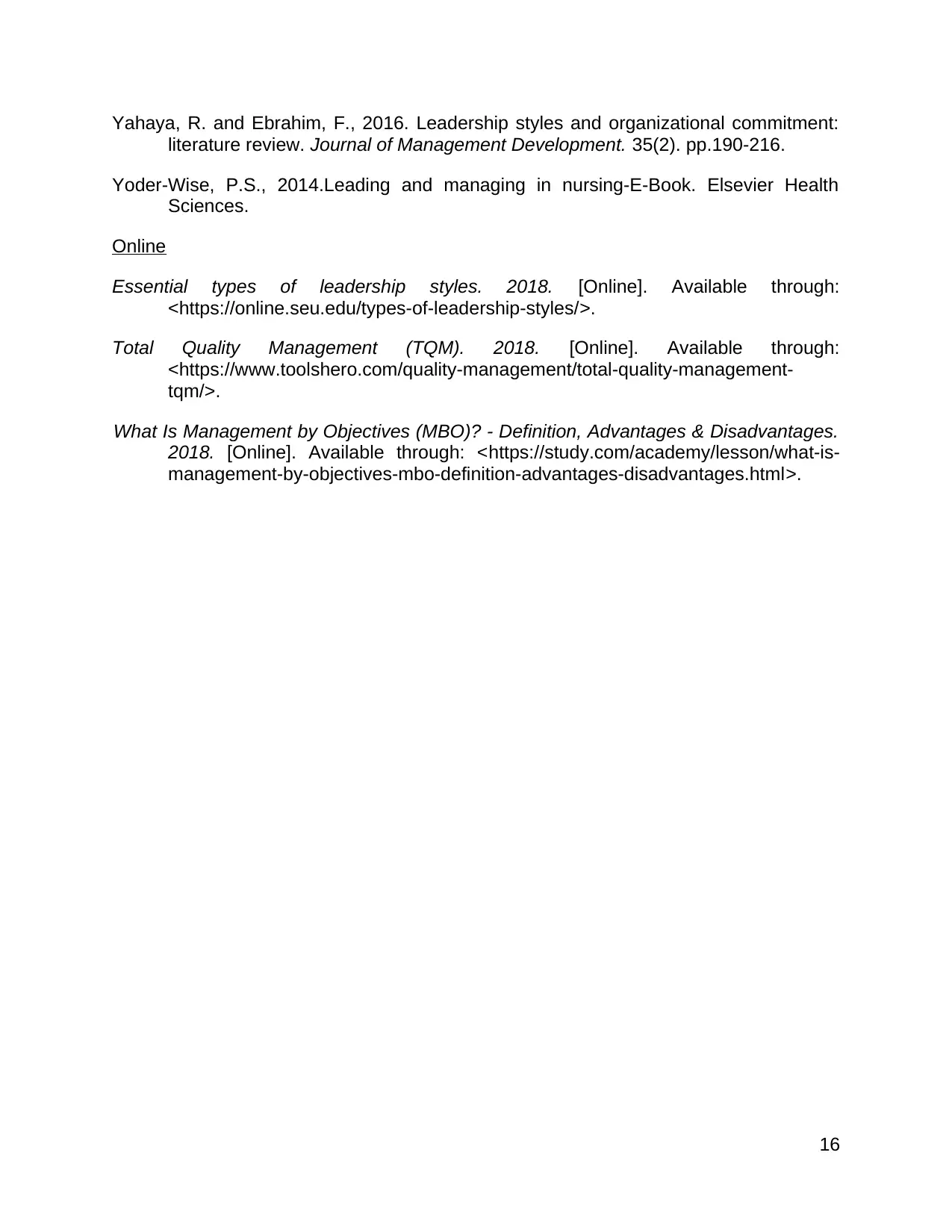
Yahaya, R. and Ebrahim, F., 2016. Leadership styles and organizational commitment:
literature review. Journal of Management Development. 35(2). pp.190-216.
Yoder-Wise, P.S., 2014.Leading and managing in nursing-E-Book. Elsevier Health
Sciences.
Online
Essential types of leadership styles. 2018. [Online]. Available through:
<https://online.seu.edu/types-of-leadership-styles/>.
Total Quality Management (TQM). 2018. [Online]. Available through:
<https://www.toolshero.com/quality-management/total-quality-management-
tqm/>.
What Is Management by Objectives (MBO)? - Definition, Advantages & Disadvantages.
2018. [Online]. Available through: <https://study.com/academy/lesson/what-is-
management-by-objectives-mbo-definition-advantages-disadvantages.html>.
16
literature review. Journal of Management Development. 35(2). pp.190-216.
Yoder-Wise, P.S., 2014.Leading and managing in nursing-E-Book. Elsevier Health
Sciences.
Online
Essential types of leadership styles. 2018. [Online]. Available through:
<https://online.seu.edu/types-of-leadership-styles/>.
Total Quality Management (TQM). 2018. [Online]. Available through:
<https://www.toolshero.com/quality-management/total-quality-management-
tqm/>.
What Is Management by Objectives (MBO)? - Definition, Advantages & Disadvantages.
2018. [Online]. Available through: <https://study.com/academy/lesson/what-is-
management-by-objectives-mbo-definition-advantages-disadvantages.html>.
16
1 out of 18
Related Documents
Your All-in-One AI-Powered Toolkit for Academic Success.
+13062052269
info@desklib.com
Available 24*7 on WhatsApp / Email
![[object Object]](/_next/static/media/star-bottom.7253800d.svg)
Unlock your academic potential
© 2024 | Zucol Services PVT LTD | All rights reserved.





